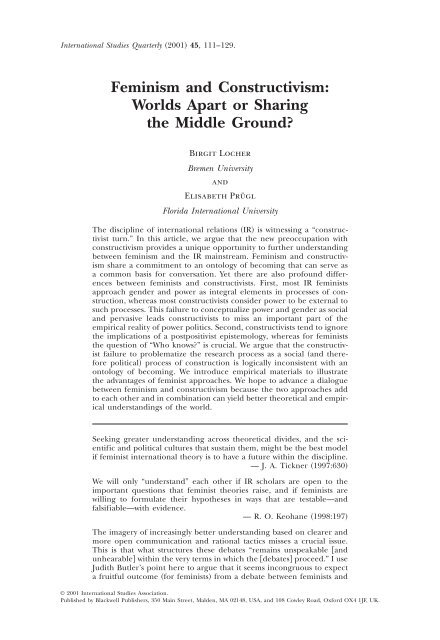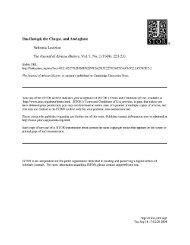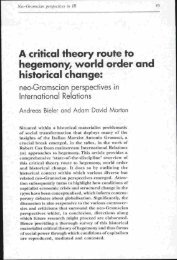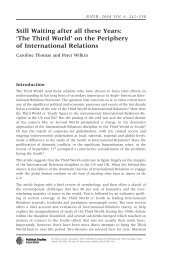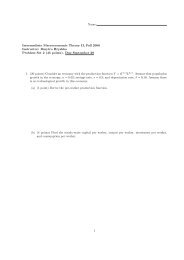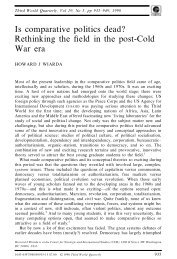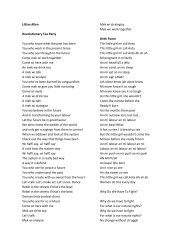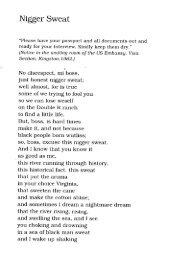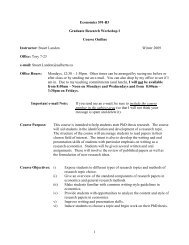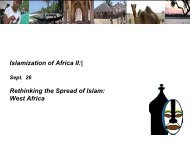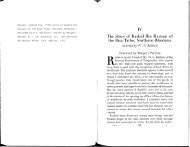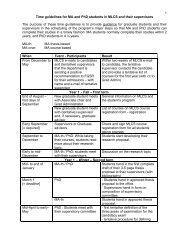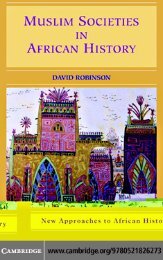Feminism and Constructivism: Worlds Apart or Sharing the Middle ...
Feminism and Constructivism: Worlds Apart or Sharing the Middle ...
Feminism and Constructivism: Worlds Apart or Sharing the Middle ...
Create successful ePaper yourself
Turn your PDF publications into a flip-book with our unique Google optimized e-Paper software.
International Studies Quarterly ~2001! 45, 111–129.<br />
<strong>Feminism</strong> <strong>and</strong> <strong>Constructivism</strong>:<br />
<strong>W<strong>or</strong>lds</strong> <strong>Apart</strong> <strong>or</strong> <strong>Sharing</strong><br />
<strong>the</strong> <strong>Middle</strong> Ground?<br />
Birgit Locher<br />
Bremen University<br />
<strong>and</strong><br />
Elisabeth Prügl<br />
Fl<strong>or</strong>ida International University<br />
The discipline of international relations ~IR! is witnessing a “constructivist<br />
turn.” In this article, we argue that <strong>the</strong> new preoccupation with<br />
constructivism provides a unique opp<strong>or</strong>tunity to fur<strong>the</strong>r underst<strong>and</strong>ing<br />
between feminism <strong>and</strong> <strong>the</strong> IR mainstream. <strong>Feminism</strong> <strong>and</strong> constructivism<br />
share a commitment to an ontology of becoming that can serve as<br />
a common basis f<strong>or</strong> conversation. Yet <strong>the</strong>re are also profound differences<br />
between feminists <strong>and</strong> constructivists. First, most IR feminists<br />
approach gender <strong>and</strong> power as integral elements in processes of construction,<br />
whereas most constructivists consider power to be external to<br />
such processes. This failure to conceptualize power <strong>and</strong> gender as social<br />
<strong>and</strong> pervasive leads constructivists to miss an imp<strong>or</strong>tant part of <strong>the</strong><br />
empirical reality of power politics. Second, constructivists tend to ign<strong>or</strong>e<br />
<strong>the</strong> implications of a postpositivist epistemology, whereas f<strong>or</strong> feminists<br />
<strong>the</strong> question of “Who knows?” is crucial. We argue that <strong>the</strong> constructivist<br />
failure to problematize <strong>the</strong> research process as a social ~<strong>and</strong> <strong>the</strong>ref<strong>or</strong>e<br />
political! process of construction is logically inconsistent with an<br />
ontology of becoming. We introduce empirical materials to illustrate<br />
<strong>the</strong> advantages of feminist approaches. We hope to advance a dialogue<br />
between feminism <strong>and</strong> constructivism because <strong>the</strong> two approaches add<br />
to each o<strong>the</strong>r <strong>and</strong> in combination can yield better <strong>the</strong><strong>or</strong>etical <strong>and</strong> empirical<br />
underst<strong>and</strong>ings of <strong>the</strong> w<strong>or</strong>ld.<br />
Seeking greater underst<strong>and</strong>ing across <strong>the</strong><strong>or</strong>etical divides, <strong>and</strong> <strong>the</strong> scientific<br />
<strong>and</strong> political cultures that sustain <strong>the</strong>m, might be <strong>the</strong> best model<br />
if feminist international <strong>the</strong><strong>or</strong>y is to have a future within <strong>the</strong> discipline.<br />
— J. A. Tickner ~1997:630!<br />
We will only “underst<strong>and</strong>” each o<strong>the</strong>r if IR scholars are open to <strong>the</strong><br />
imp<strong>or</strong>tant questions that feminist <strong>the</strong><strong>or</strong>ies raise, <strong>and</strong> if feminists are<br />
willing to f<strong>or</strong>mulate <strong>the</strong>ir hypo<strong>the</strong>ses in ways that are testable—<strong>and</strong><br />
falsifiable—with evidence.<br />
— R. O. Keohane ~1998:197!<br />
The imagery of increasingly better underst<strong>and</strong>ing based on clearer <strong>and</strong><br />
m<strong>or</strong>e open communication <strong>and</strong> rational tactics misses a crucial issue.<br />
This is that what structures <strong>the</strong>se debates “remains unspeakable @<strong>and</strong><br />
unhearable# within <strong>the</strong> very terms in which <strong>the</strong> @debates# proceed.” I use<br />
Judith Butler’s point here to argue that it seems incongruous to expect<br />
a fruitful outcome ~f<strong>or</strong> feminists! from a debate between feminists <strong>and</strong><br />
© 2001 International Studies Association.<br />
Published by Blackwell Publishers, 350 Main Street, Malden, MA 02148, USA, <strong>and</strong> 108 Cowley Road, Oxf<strong>or</strong>d OX4 1JF, UK.
112 <strong>Feminism</strong> <strong>and</strong> <strong>Constructivism</strong><br />
mainstream International Relations <strong>the</strong><strong>or</strong>ists if <strong>the</strong> debate is structured<br />
around representations of woman as derivative, marginal <strong>and</strong> intellectually<br />
suspect.<br />
— M. Zalewski ~1998:864!<br />
“You just don’t underst<strong>and</strong>”—this is how Ann Tickner ~1997! entitled her description<br />
of <strong>the</strong> “troubled engagements between feminists <strong>and</strong> IR <strong>the</strong><strong>or</strong>ists,” which,<br />
she argues, have been characterized by misunderst<strong>and</strong>ing <strong>and</strong> a disregard f<strong>or</strong><br />
feminist interventions. Tickner locates <strong>the</strong> reasons f<strong>or</strong> <strong>the</strong> trouble in differing<br />
ontologies <strong>and</strong> epistemologies. Robert Keohane’s response to Tickner seems to<br />
confirm her argument: “IR scholars” will underst<strong>and</strong> only if feminists renounce<br />
“ideology” <strong>and</strong> commit <strong>the</strong>mselves to “<strong>the</strong> basic method of social science” narrowly<br />
conceived as hypo<strong>the</strong>sis testing ~Keohane, 1998:196!. In light of this position,<br />
Marysia Zalewski’s conclusion is compelling: feminists <strong>and</strong> mainstream<br />
international relations ~IR! scholars will never underst<strong>and</strong> each o<strong>the</strong>r as long as<br />
<strong>the</strong> quest f<strong>or</strong> underst<strong>and</strong>ing is based on “<strong>the</strong> politics, epistemologies <strong>and</strong> ontologies<br />
of <strong>the</strong> o<strong>the</strong>r,” on a logic that maintains woman in “repression, cens<strong>or</strong>ship<br />
<strong>and</strong> nonrecognition” ~Zalewski, 1998:864, quoting Irigaray!. Indeed, many feminists<br />
have found it possible to go on with <strong>the</strong>ir empirical research only after<br />
shaking off <strong>the</strong> strictures of <strong>the</strong> discipline ~e.g. Enloe, 1989, 1993; Moon, 1997!.<br />
O<strong>the</strong>rs continue <strong>the</strong> w<strong>or</strong>k of deconstructing <strong>the</strong> discipline <strong>and</strong> <strong>the</strong> practices it<br />
gives rise to ~e.g. Weber, 1999!. Apparently, <strong>the</strong>y eschew <strong>the</strong> very goal of shared<br />
epistemologies <strong>and</strong> ontologies: “We will never convert someone who is not already<br />
converted. We will never touch <strong>the</strong> heart that lives on ano<strong>the</strong>r planet” ~Zalewski,<br />
1998:864, quoting Hélène Cixous!.<br />
In this article we seek to move f<strong>or</strong>ward a debate that seems to have reached a<br />
dead end. Taking up again Tickner’s quest to find a terrain of underst<strong>and</strong>ing<br />
between feminists <strong>and</strong> IR <strong>the</strong><strong>or</strong>ists, we suggest that <strong>the</strong> third ~<strong>or</strong> fourth, see<br />
Wæver, 1996! debate of <strong>the</strong> late 1990s has provided a new basis f<strong>or</strong> an engagement<br />
between feminists <strong>and</strong> <strong>the</strong> mainstream. Specifically, we argue that constructivism<br />
shares ontological grounds with feminism <strong>and</strong> thus provides a unique<br />
window of opp<strong>or</strong>tunity f<strong>or</strong> underst<strong>and</strong>ing.<br />
With ideas <strong>and</strong> concepts b<strong>or</strong>rowed from sociology, constructivism made a<br />
prominent appearance in IR in <strong>the</strong> late 1980s. Since <strong>the</strong>n, <strong>the</strong> U.S. mainstream<br />
has appointed it <strong>the</strong> gr<strong>and</strong> alternative to rationalist approaches, whereas in<br />
Europe it is m<strong>or</strong>e frequently seen as occupying <strong>the</strong> middle ground between<br />
rational-choice approaches <strong>and</strong> postmodernism ~Adler, 1997; Katzenstein, Keohane,<br />
<strong>and</strong> Krasner, 1998; Checkel, 1998; Price <strong>and</strong> Reus-Smit, 1998!. In positioning<br />
constructivism as a new middle, Europeans avoid <strong>the</strong> silencing of postmodern<br />
approaches typical in <strong>the</strong> United States. But describing constructivism as a third<br />
f<strong>or</strong>ce occupying a consensual middle ground is perilous f<strong>or</strong> o<strong>the</strong>r reasons. Advocates<br />
of such a positioning skirt basic questions of epistemology, ontology, <strong>and</strong><br />
axiology while m<strong>or</strong>phing fundamental incompatibilities into questions of ranking<br />
<strong>and</strong> <strong>or</strong>dering variables <strong>and</strong> of m<strong>or</strong>e rig<strong>or</strong>ous <strong>and</strong> m<strong>or</strong>e parsimonious explanations<br />
of reality. In effect, <strong>the</strong>y fail to take seriously <strong>the</strong> postpositivist critique.<br />
In using <strong>the</strong> language of a middle ground we are thus entering treacherous<br />
territ<strong>or</strong>y <strong>and</strong> some w<strong>or</strong>ds of caution are in <strong>or</strong>der. We do not advocate a <strong>the</strong><strong>or</strong>y<br />
merger following <strong>the</strong> path of “shotgun wedding, unhappy marriage, no-fault<br />
div<strong>or</strong>ce” that Shelton <strong>and</strong> Aggar ~1993! identified in <strong>the</strong> troubled relationship of<br />
feminism <strong>and</strong> Marxism. This would risk papering over considerable diversity<br />
among feminists <strong>and</strong> constructivists as well as making light of profound differences<br />
between <strong>the</strong> two. Fur<strong>the</strong>rm<strong>or</strong>e, it would risk styling feminism as supplementary<br />
to constructivism, thus reproducing its marginality by framing it as<br />
derivative. As Ann Tickner reminds us ~1997:620!, feminism is a rich body of
Birgit Locher <strong>and</strong> Elisabeth Prügl 113<br />
<strong>the</strong><strong>or</strong>y that offers much m<strong>or</strong>e than adding <strong>the</strong> particularity of women <strong>and</strong> gender<br />
to a general picture. Or, in Cynthia Weber’s w<strong>or</strong>ds ~1994:337!, feminism does<br />
not need a fa<strong>the</strong>r <strong>the</strong><strong>or</strong>y; it is nei<strong>the</strong>r a “good girl” n<strong>or</strong> a “little” <strong>or</strong> a “bad girl.”<br />
Thus, although our primary goal is to seek points of dialogue, as Tickner suggests<br />
in <strong>the</strong> epigraph, we also want to reveal points of friction that emerge from<br />
<strong>the</strong> o<strong>the</strong>ring of women that Zalewski finds characteristic.<br />
We base our dialogue on <strong>the</strong> idea that feminism <strong>and</strong> constructivism share an<br />
ontology <strong>and</strong> develop <strong>the</strong> notion of a “feminist constructivism” that defines our<br />
own st<strong>and</strong>point. Many feminists in IR agree that gender, one of <strong>the</strong>ir most<br />
imp<strong>or</strong>tant analytical categ<strong>or</strong>ies, 1 is a social construct. Indeed, feminists in IR<br />
were talking about social construction long bef<strong>or</strong>e <strong>the</strong> notion captured a broad<br />
audience. We argue in this article that constructivist ontology f<strong>or</strong>ms a “planet”<br />
on which both feminists <strong>and</strong> ~at least some! IR <strong>the</strong><strong>or</strong>ists could live <strong>and</strong> talk.<br />
However, many feminists are profoundly uncomf<strong>or</strong>table with <strong>the</strong> styling of constructivism<br />
as <strong>the</strong> gr<strong>and</strong> alternative <strong>or</strong> new middle ground, <strong>and</strong> most selfidentified<br />
constructivists have followed <strong>the</strong> example of most of <strong>the</strong>ir rationalist<br />
colleagues in ign<strong>or</strong>ing feminist literature <strong>and</strong> gender analysis. Our challenge is<br />
<strong>the</strong>ref<strong>or</strong>e to stake out a middle ground that does not obliterate feminism <strong>and</strong> to<br />
search f<strong>or</strong> a terrain that enables engagement on equal terms.<br />
We believe that a dialogue between feminism <strong>and</strong> constructivism is imp<strong>or</strong>tant<br />
because <strong>the</strong> two approaches add to each o<strong>the</strong>r <strong>and</strong> in combination can yield<br />
better <strong>the</strong><strong>or</strong>etical <strong>and</strong> empirical underst<strong>and</strong>ings of <strong>the</strong> w<strong>or</strong>ld. Elsewhere ~Locher<br />
<strong>and</strong> Prügl, 2001! we argue that constructivism contributes to feminism a <strong>the</strong><strong>or</strong>y<br />
of agency. Here we reverse <strong>the</strong> emphasis, showing that feminism contributes to<br />
constructivism an underst<strong>and</strong>ing of power as an integral element of processes of<br />
construction. Because <strong>the</strong>y leave <strong>the</strong> social construction of power under<strong>the</strong><strong>or</strong>ized,<br />
constructivists lack <strong>the</strong> tools to explain how gender <strong>and</strong> power reproduce,<br />
how <strong>and</strong> why certain constructs emerge as m<strong>or</strong>e influential than o<strong>the</strong>rs. They<br />
miss an imp<strong>or</strong>tant part of <strong>the</strong> empirical reality of international politics. Fur<strong>the</strong>rm<strong>or</strong>e,<br />
constructivists not sensitive to power as a social <strong>and</strong> gendered construct<br />
risk epistemological inconsistencies. If constructivism wants to be m<strong>or</strong>e than<br />
liberalism in a new cloth, if it wants to retain its critical potential, it needs to take<br />
seriously <strong>the</strong> epistemological critiques of feminists <strong>and</strong> postmodernists. 2<br />
We proceed in two stages. First, we expl<strong>or</strong>e <strong>the</strong> intersections of feminist <strong>and</strong><br />
constructivist thought in <strong>the</strong> area of ontology, highlighting compatibilities <strong>and</strong><br />
problems. Second, we expl<strong>or</strong>e feminist <strong>and</strong> constructivist epistemologies by problematizing<br />
<strong>the</strong> position of <strong>the</strong> knowing subject. We conclude by probing <strong>the</strong><br />
empirical relevance of our <strong>the</strong><strong>or</strong>etical arguments. We locate ourselves on <strong>the</strong><br />
b<strong>or</strong>derlines between feminism <strong>and</strong> constructivism, attempting an engagement<br />
based on empa<strong>the</strong>tic cooperation, a feminist method Christine Sylvester has<br />
proposed f<strong>or</strong> IR. This approach entails “a process of positional slippage that<br />
occurs when one listens seriously to <strong>the</strong> concerns, fears, <strong>and</strong> agendas of those<br />
one is unaccustomed to heeding when building social <strong>the</strong><strong>or</strong>y, taking on board<br />
ra<strong>the</strong>r than dismissing, finding in <strong>the</strong> concerns of o<strong>the</strong>rs b<strong>or</strong>derl<strong>and</strong>s of one’s<br />
own concerns <strong>and</strong> fears” ~Sylvester, 1994:317!. In adopting such shifting positions<br />
we negotiate our own ambiguous st<strong>and</strong>points not only between constructivism<br />
<strong>and</strong> feminism but also between <strong>the</strong> U.S. <strong>and</strong> <strong>the</strong> German academic w<strong>or</strong>lds that<br />
we have experienced <strong>and</strong> that separate us now.<br />
1 O<strong>the</strong>rs are “women” <strong>and</strong> “sex,” in addition to “race,” “class,” “ethnicity,” <strong>and</strong> o<strong>the</strong>r markers of difference.<br />
2 In this paper we skirt <strong>the</strong> question of how feminism relates to postmodernism. Clearly many feminist insights<br />
into power are indebted to poststructuralist <strong>the</strong><strong>or</strong>izing, <strong>and</strong> <strong>the</strong>re are feminists in IR who m<strong>or</strong>e faithfully adhere to<br />
poststructuralist principles than we do in this paper. Although we are aware that <strong>the</strong> emphasis on “texts,” in<br />
particular in <strong>the</strong> w<strong>or</strong>k of Derrida, is difficult to reconcile with <strong>the</strong> constructivist focus on “agency,” we believe that<br />
a constructivist ref<strong>or</strong>mulation of poststructuralist insights on power need not diminish <strong>the</strong>ir f<strong>or</strong>ce.
114 <strong>Feminism</strong> <strong>and</strong> <strong>Constructivism</strong><br />
An Ontology of Becoming<br />
The new enthusiasm in <strong>the</strong> United States about constructivism as <strong>the</strong> alternative<br />
to rational choice <strong>and</strong> as a middle ground between utilitarian approaches <strong>and</strong><br />
postmodernism in <strong>the</strong> European debate imposes an unwarranted homogeneity<br />
on constructivist scholarship. In practice, self-identified constructivists subscribe<br />
to a diverse set of sometimes incompatible propositions. Contention exists around<br />
c<strong>or</strong>e assumptions <strong>and</strong> philosophical foundations. Some subsume constructivism<br />
under writings probing ideational causation ~e.g., Yee, 1996!, some take n<strong>or</strong>ms<br />
<strong>and</strong> social context as its crucial explanat<strong>or</strong>y variables ~e.g., Finnem<strong>or</strong>e, 1996;<br />
Katzenstein, 1996; Risse-Kappen, 1996!, some consider institutionalization <strong>and</strong><br />
intersubjectivity its key concerns ~Ruggie, 1998a, 1998b!, whereas o<strong>the</strong>rs find its<br />
central preoccupation to be language ~Onuf, 1989; Fierke, 1997!. Some constructivists<br />
draw <strong>the</strong>ir insights from philosophical realism, some from <strong>the</strong> sociological<br />
classics ~Durkheim <strong>and</strong> Weber, often via Anthony Giddens!, some from Wittgenstein<br />
<strong>and</strong> speech act <strong>the</strong><strong>or</strong>y, some from <strong>the</strong> writings of French poststructuralists. 3<br />
But what diverse constructivisms do have in common is an ontology: a way to<br />
depict <strong>the</strong> w<strong>or</strong>ld. Constructivists describe <strong>the</strong> w<strong>or</strong>ld not as one that is, but as one<br />
that is in <strong>the</strong> process of becoming; <strong>the</strong>y replace a “positional” with a “transf<strong>or</strong>mational<br />
ontology” ~Dessler, 1989:444; Ruggie, 1998a:863; Kubálková, Onuf, <strong>and</strong><br />
Kowert, 1998; see also Wendt, 1987:355!. Taking <strong>the</strong>ir clues from sociology,<br />
constructivists argue that international life is social: international relations are<br />
constructed when people talk, follow rules <strong>and</strong> n<strong>or</strong>ms, are guided by w<strong>or</strong>ld views<br />
<strong>or</strong> institutions, perf<strong>or</strong>m rituals, <strong>and</strong> engage in various social practices. The constructivist<br />
focus of inquiry <strong>the</strong>ref<strong>or</strong>e is social phenomena, such as n<strong>or</strong>ms, rules,<br />
institutions, language, <strong>or</strong> productions. These phenomena mediate agency ~ontologically<br />
privileged in behavi<strong>or</strong>alist <strong>and</strong> rational choice approaches! <strong>and</strong> structure<br />
~ontologically privileged in structural realism <strong>and</strong> w<strong>or</strong>ld systems <strong>the</strong><strong>or</strong>y!.<br />
Ra<strong>the</strong>r than subscribing to <strong>the</strong> incompatibility of explanations from different<br />
levels of analysis, constructivists argue that agency <strong>and</strong> structure are co-constituted. 4<br />
Structures reproduce through <strong>the</strong> practices of knowledgeable agents while at <strong>the</strong><br />
same time enabling <strong>the</strong>se practices. 5 Depending on <strong>the</strong>ir <strong>or</strong>ientation, constructivists<br />
variously take n<strong>or</strong>ms, rules, institutions, <strong>or</strong> language as <strong>the</strong> media of this<br />
reproduction. These social f<strong>or</strong>ms are intimately implicated in w<strong>or</strong>ld politics not<br />
only because of <strong>the</strong>ir regulative, but also because of <strong>the</strong>ir constitutive, effects:<br />
<strong>the</strong>y guide conduct while at <strong>the</strong> same time creating objects <strong>and</strong> agents.<br />
An ontology of becoming allows constructivists to account f<strong>or</strong> aspects of w<strong>or</strong>ld<br />
politics that ne<strong>or</strong>ealism <strong>and</strong> neoliberalism obscure. First, constructivists have put<br />
in <strong>the</strong> center of attention <strong>the</strong> constitution of international agents. No longer are<br />
sovereign states <strong>and</strong> o<strong>the</strong>r international agents considered as given <strong>and</strong> preexisting<br />
entities, but national interests, state identities, social movements, <strong>and</strong> transnational<br />
netw<strong>or</strong>ks appear in need of explanation ~e.g., Wendt, 1994; Risse-Kappen,<br />
1995a; Finnem<strong>or</strong>e, 1996; Kowert, 1998; Neumann, 1999!. Second, because <strong>the</strong>y<br />
focus on <strong>the</strong> construction of interests <strong>and</strong> identities, constructivists can explain<br />
shifts in strategies. F<strong>or</strong> example, war making <strong>and</strong> negotiations are not instrumental<br />
tools toward an end but constitute <strong>the</strong> enactment of diverse games <strong>and</strong><br />
rules on which reasoning act<strong>or</strong>s draw ~Fierke, 1996; Duffy, Frederking, <strong>and</strong> Tucker,<br />
3 F<strong>or</strong> a categ<strong>or</strong>ization of constructivists ~including some feminists! acc<strong>or</strong>ding to philosophical bases, see Ruggie,<br />
1998a ~880–882!. Price <strong>and</strong> Reus-Smit distinguish “modernists” <strong>and</strong> “postmodernists” ~1998:267ff!. Ruggie does not<br />
identify Wittgenstein as providing philosophical roots separate from <strong>the</strong> sociological classics <strong>and</strong> <strong>the</strong>reby papers<br />
over substantial differences. F<strong>or</strong> a f<strong>or</strong>ceful argument in fav<strong>or</strong> of a Wittgensteinian constructivism, see Fierke, 1996,<br />
1997 ~45!; also Onuf, 1989.<br />
4 F<strong>or</strong> a summary of <strong>the</strong> protracted agent-structure debate, see Gould, 1998.<br />
5 The writings of Anthony Giddens have provided inspiration f<strong>or</strong> many constructivists in IR on this issue. See<br />
Giddens, 1984. Giddens is discussed in Onuf, 1989 ~36! <strong>and</strong> Wendt, 1987 ~356!.
Birgit Locher <strong>and</strong> Elisabeth Prügl 115<br />
1998!. Third, in combining agency <strong>and</strong> structure, constructivists have been able<br />
to develop rich underst<strong>and</strong>ings of social change. This has made <strong>the</strong> approach<br />
attractive to those who seek to explain <strong>the</strong> transition from <strong>the</strong> medieval to <strong>the</strong><br />
Westphalian system, <strong>the</strong> end of <strong>the</strong> Cold War, <strong>or</strong> <strong>the</strong> transf<strong>or</strong>mation of w<strong>or</strong>ld<br />
politics through <strong>the</strong> streng<strong>the</strong>ning of “global civil society” ~Koslovski <strong>and</strong> Kratochwil,<br />
1994; Klotz <strong>and</strong> Lynch, 1996; Ruggie, 1998a!. 6<br />
Like constructivism, feminism is diverse in range <strong>and</strong> <strong>or</strong>ientation, <strong>and</strong> not all<br />
feminists employ a constructivist ontology. Yet, among Western feminists <strong>the</strong><br />
contention that gender, <strong>and</strong> indeed woman, is a social construct has been influential.<br />
Liberal ideas of women’s equality, socialist ideas of a sexual division of lab<strong>or</strong>,<br />
<strong>the</strong> Freudian suggestion that identities are produced, <strong>and</strong> functionalist ideas on<br />
sex roles all had come toge<strong>the</strong>r by <strong>the</strong> middle of <strong>the</strong> twentieth century to th<strong>or</strong>oughly<br />
undermine any suggestion that gender was a biological <strong>or</strong> natural given<br />
~Connell, 1987!. Writers in <strong>the</strong> second wave of <strong>the</strong> feminist movement in Europe<br />
<strong>and</strong> N<strong>or</strong>th America linked <strong>the</strong>se insights to an analysis of women’s sub<strong>or</strong>dination,<br />
suggesting that gender not only was a social construct, but also created<br />
women’s oppression. Simone de Beauvoir’s The Second Sex, published in France in<br />
1949 <strong>and</strong> in <strong>the</strong> United States in 1952, was a l<strong>and</strong>mark documenting this relationship,<br />
drawing on structuralist thinking. Increasingly, <strong>and</strong> in parallel to movement<br />
slogans that suggested “<strong>the</strong> personal is political” <strong>and</strong> “<strong>the</strong> political is personal,”<br />
feminist writings expl<strong>or</strong>ed gender messages in areas beyond households <strong>and</strong> personal<br />
identities: in myths, ideologies, <strong>and</strong> patriarchal institutions, such as <strong>the</strong> family,<br />
<strong>the</strong> state, <strong>and</strong> <strong>the</strong> division of lab<strong>or</strong> ~e.g., Barrett, 1988!. W<strong>or</strong>king in different<br />
research traditions, feminists approached <strong>the</strong>se <strong>the</strong>mes in very different ways.<br />
When we juxtapose feminism <strong>and</strong> constructivism in <strong>the</strong> following, we primarily<br />
refer to <strong>the</strong> writings of feminists that are self-identified scholars of international<br />
relations, many affiliated with European <strong>and</strong> N<strong>or</strong>th American associations of<br />
international relations <strong>or</strong> political science, teaching in various ~mostly U.S., Canadian,<br />
British, <strong>and</strong> Australian! universities. They constitute a community of scholars<br />
who read <strong>and</strong> refer to each o<strong>the</strong>r’s w<strong>or</strong>k. A set of programmatic writings<br />
~including Enloe, 1989; Tickner, 1992; Peterson, 1992a; Sylvester, 1994; Whitw<strong>or</strong>th,<br />
1994! helped create this netw<strong>or</strong>k of scholars about a decade ago <strong>and</strong> still<br />
provide an imp<strong>or</strong>tant point of reference. Yet, while feminist IR scholars share a<br />
~sometimes vague! commitment to <strong>the</strong> field of international relations, most are<br />
committed to <strong>the</strong> notion of social construction, albeit on <strong>the</strong> basis of diverse<br />
<strong>the</strong><strong>or</strong>etical <strong>and</strong> empirical <strong>or</strong>ientations ~compare Steans, 1998!.<br />
Starting from critical <strong>the</strong><strong>or</strong>y, social construction appears as an interaction of<br />
<strong>the</strong> Coxian triad of material conditions, institutions, <strong>and</strong> ideas in <strong>the</strong> w<strong>or</strong>ks of<br />
S<strong>and</strong>ra Whitw<strong>or</strong>th ~1994! <strong>and</strong> Deb<strong>or</strong>ah Stienstra ~1994!. In this perspective, social<br />
construction designates an opposition to <strong>the</strong> material w<strong>or</strong>ld <strong>and</strong> is characterized<br />
by malleability <strong>and</strong> context dependency. V. Spike Peterson combines <strong>the</strong> structuralist<br />
notion of a fundamental dichotomy between genders with an underst<strong>and</strong>ing<br />
that people are socialized into <strong>the</strong>ir genders while social expectations <strong>and</strong><br />
ideologies reproduce notions of masculinity <strong>and</strong> femininity. She refers to gender<br />
as a “systematic social construction that dichotomizes identities, behavi<strong>or</strong>s, <strong>and</strong><br />
expectations as masculine <strong>and</strong> feminine.” It is, acc<strong>or</strong>ding to her, not “simply a<br />
trait of individuals but an institutionalized feature of social life” ~1992b:194; see<br />
also Peterson <strong>and</strong> Runyan, 1993:5–7!. Tickner ~1992:6!, following Connell ~1987!,<br />
introduces <strong>the</strong> notion of “hegemonic masculinity,” a cluster of character traits<br />
including toughness, courage, power, independence, <strong>and</strong> physical strength that<br />
6 Note that this ability to explain change is lost in approaches that take n<strong>or</strong>ms <strong>or</strong> culture as explanat<strong>or</strong>y<br />
variables ~Kowert <strong>and</strong> Legro, 1996!. This lies at <strong>the</strong> basis of Finnem<strong>or</strong>e <strong>and</strong> Sikkink’s puzzling statement that “like<br />
o<strong>the</strong>r <strong>the</strong><strong>or</strong>etical framew<strong>or</strong>ks in international relations ~IR!, much of <strong>the</strong> macro<strong>the</strong><strong>or</strong>etical equipment of constructivism<br />
is better at explaining stability than change” ~1998:888!.
116 <strong>Feminism</strong> <strong>and</strong> <strong>Constructivism</strong><br />
define a cultural ideal. Sustained through its opposition to devalued masculinities<br />
<strong>and</strong> femininities, hegemonic masculinity perpetuates masculinized power<br />
structures, including those that frame international relations as a practice <strong>and</strong> a<br />
field. The notion of hegemonic masculinity has lent itself to studying identities<br />
in international affairs by employing an underst<strong>and</strong>ing of social construction as<br />
discursive. Charlotte Hooper ~1998, 2000!, f<strong>or</strong> example, analyzes discursive practices<br />
of w<strong>or</strong>ld politics <strong>and</strong> discourses of globalization as sites of social construction.<br />
Similarly, Christine Sylvester ~1994, 1998! draws on discourse <strong>the</strong><strong>or</strong>ies to<br />
develop an underst<strong>and</strong>ing of social construction that privileges “temp<strong>or</strong>ary homesteads”<br />
over stable identities. F<strong>or</strong> her, “socially constructed” means “that men<br />
<strong>and</strong> women are <strong>the</strong> st<strong>or</strong>ies that have been told about ‘men’ <strong>and</strong> ‘women’ <strong>and</strong> <strong>the</strong><br />
constraints <strong>and</strong> opp<strong>or</strong>tunities that have hereby arisen as we take to our proper<br />
places” ~Sylvester, 1994:4!. Cynthia Enloe ~1989, 1993! perhaps most explicitly<br />
combines <strong>the</strong> modern <strong>and</strong> postmodern tendencies revealed in <strong>the</strong>se approaches.<br />
She claims that relationships between governments depend on <strong>the</strong> construction<br />
<strong>and</strong> reconstruction of gender <strong>and</strong> that such relations produce certain notions of<br />
femininity <strong>and</strong> masculinity. Gender in her w<strong>or</strong>k emerges as constitutive of international<br />
relations <strong>and</strong> vice versa, global politics create gender.<br />
We would do f<strong>or</strong>ce to <strong>the</strong>se writings if we were to subsume <strong>the</strong>m under <strong>the</strong><br />
label “feminist constructivist.” But we do b<strong>or</strong>row from <strong>the</strong>m eclectically to develop<br />
our own feminist constructivist position. This position insists that agents make<br />
w<strong>or</strong>ld politics but also underst<strong>and</strong>s masculinities <strong>and</strong> femininities as an effect of<br />
such politics. It fur<strong>the</strong>rm<strong>or</strong>e suggests that <strong>the</strong> focus on identity does not exhaust<br />
feminist constructivist approaches to IR. Such approaches can subsume as well<br />
studies of socialization, institutions, n<strong>or</strong>ms, <strong>and</strong> o<strong>the</strong>r social phenomena currently<br />
underrepresented in <strong>the</strong> study of gender in IR.<br />
Feminist constructivists share with o<strong>the</strong>r constructivists in IR an ontology of<br />
becoming. This, however, does not preclude differences. First, IR feminists insist<br />
that gender is pervasive in an international w<strong>or</strong>ld that is socially constructed:<br />
“<strong>the</strong> personal is international” <strong>and</strong> “<strong>the</strong> international is personal” ~Enloe, 1989:196!.<br />
Thus, gender inheres in all international politics. It has shaped <strong>and</strong> enabled processes<br />
of state f<strong>or</strong>mation, war <strong>and</strong> peace, <strong>and</strong> revolutions ~Peterson, 1992a; Tétreault,<br />
1994; Pettman, 1996!. It has inf<strong>or</strong>med international political economics ~March<strong>and</strong><br />
<strong>and</strong> Parpart, 1995; Han <strong>and</strong> Ling, 1998; Chin, 1998; Adler, 1999!, is pervasive<br />
in international <strong>or</strong>ganizations <strong>and</strong> <strong>the</strong> practices of global governance ~Whitw<strong>or</strong>th,<br />
1994; Stienstra, 1994; Meyer <strong>and</strong> Prügl, 1999; Prügl, 1999!, <strong>and</strong> has shaped<br />
f<strong>or</strong>eign policies ~Moon, 1997!. F<strong>or</strong> IR feminists it is impossible to talk about any<br />
of <strong>the</strong>se processes without talking about gender. In contrast, constructivists tend<br />
to consider gender subtexts in IR as marginal to explanations of most phenomena<br />
that interest <strong>the</strong>m <strong>and</strong> gender politics outside <strong>the</strong> realm of power politics.<br />
At <strong>the</strong> c<strong>or</strong>e of this divergence are different conceptions of power. Unlike most<br />
constructivists, IR feminists consider power a social construct <strong>and</strong> gender a code<br />
f<strong>or</strong> power. Many have adopted ~explicitly Tickner, 1992:7, 1997:615; Grant <strong>and</strong><br />
Newl<strong>and</strong>, 1991! Joan Scott’s definition of gender as consisting of two elements:<br />
social construction <strong>and</strong> power. Acc<strong>or</strong>ding to Scott, “gender is a constitutive<br />
element of social relationships based on perceived differences between <strong>the</strong> sexes,<br />
<strong>and</strong> gender is a primary way of signifying relationships of power” ~1986:1067!.<br />
The first part asserts a reality of social construction: gender creates social f<strong>or</strong>ms<br />
based on a binary construction of masculinity <strong>and</strong> femininity. The second part<br />
infuses power into social construction: messages of gender always also express<br />
messages of super- <strong>and</strong> sub<strong>or</strong>dination. Few constructivists in IR have similarly<br />
<strong>the</strong><strong>or</strong>ized power as a social construct, often treating it ei<strong>the</strong>r as a material<br />
quantity <strong>or</strong> as located in <strong>the</strong> institutions of <strong>the</strong> state.<br />
Among feminists in IR, two approaches to power st<strong>and</strong> out. The first conceives<br />
of gender constructions as part of a larger system of sub<strong>or</strong>dination, typically
Birgit Locher <strong>and</strong> Elisabeth Prügl 117<br />
capitalism <strong>or</strong>, less commonly, patriarchy, <strong>or</strong> some intersection of <strong>the</strong> two. It is<br />
tied to <strong>the</strong> Gramscian tradition as elab<strong>or</strong>ated by Robert Cox <strong>and</strong> often employed<br />
by those feminists whose empirical w<strong>or</strong>k focuses on <strong>the</strong> global political economy.<br />
Here gender constructions emerge as an ideology, revealed in beliefs, ideas, <strong>and</strong><br />
institutions that stabilize <strong>the</strong> system. Power is located in such ideologies <strong>and</strong> in<br />
this way is external to identities. Indeed, writings in this tradition are rarely<br />
concerned with identity f<strong>or</strong>mation as an exclusionary process but instead treat<br />
gender as a social status that intersects with o<strong>the</strong>r statuses ~e.g., class, ethnicity!<br />
to realize various contextually specific f<strong>or</strong>ms of super- <strong>and</strong> sub<strong>or</strong>dination. Acc<strong>or</strong>ding<br />
to auth<strong>or</strong>s taking this approach, states, firms, <strong>and</strong> international <strong>or</strong>ganizations<br />
play a crucial role in <strong>the</strong> construction of gender. They create <strong>and</strong> diffuse a<br />
hegemonic ideology that facilitates certain f<strong>or</strong>ms of capitalism, <strong>and</strong> gender constructs<br />
are part of this ideology ~e.g., Whitw<strong>or</strong>th, 1994; Stienstra, 1994; Chin,<br />
1998; various chapters in Kofman <strong>and</strong> Youngs, 1996!.<br />
A second group of IR feminists does not describe power as ideology but sees<br />
it located in <strong>the</strong> f<strong>or</strong>mation of identities. These writers argue that <strong>the</strong> sub<strong>or</strong>dination<br />
of women is enmeshed in modernist discourses that underst<strong>and</strong> <strong>the</strong> self as<br />
<strong>the</strong> source of agency <strong>and</strong> create this self in opposition to an “o<strong>the</strong>r” that provides<br />
a reference point of what <strong>the</strong> self is not. Coded in terms of race, ethnicity,<br />
gender, <strong>and</strong> o<strong>the</strong>r status markers, <strong>the</strong> self emerges through a denigration of this<br />
“o<strong>the</strong>r.” Gender is a particularly powerful code because it is co-constituted with<br />
sex, its presumably “natural” c<strong>or</strong>relate. Binary metaphysics, language, <strong>and</strong> symbolic<br />
<strong>or</strong>der structurally connect gender <strong>and</strong> sex, merging biology <strong>and</strong> culture<br />
<strong>and</strong> creating an all-embracing <strong>and</strong> apparently natural gendered reality. As a<br />
code f<strong>or</strong> power, gender <strong>and</strong> sex thus contribute to anch<strong>or</strong>ing modern identities.<br />
Gender constructions are not ideologies that impose <strong>the</strong>mselves from <strong>the</strong> outside<br />
but a foundational aspect of <strong>the</strong> modern subject, a necessary ingredient in<br />
<strong>the</strong> f<strong>or</strong>mation of identities. Drawing on <strong>the</strong> underst<strong>and</strong>ing of gender dichotomies<br />
as an underlying element of subject f<strong>or</strong>mation, IR feminists have argued<br />
that such dichotomies map onto <strong>the</strong> pervasive oppositions that <strong>or</strong>ganize modern<br />
science, politics, <strong>and</strong> international relations: subject0object, fact0value, public0<br />
private, protect<strong>or</strong>0protected ~Tickner, 1992:6–8; Peterson, 1992b:202!. They have<br />
expl<strong>or</strong>ed in particular <strong>the</strong> way in which gendered o<strong>the</strong>rs <strong>and</strong> naturalized identities<br />
have enabled particular security practices, finding a connection between<br />
<strong>the</strong> construction of hegemonic masculinities <strong>and</strong> <strong>the</strong> legitimization of wars ~see<br />
various chapters in Zalewski <strong>and</strong> Parpart, 1998; Elshtain, 1987; Cohn, 1987;<br />
Tickner, 1992:ch. 2; Weber, 1998!.<br />
Constructivists have dealt with power in various ways, but only a few have taken<br />
<strong>the</strong> analysis of power as far as feminists have ~compare also Doty, 1997!. First are<br />
those who have not put power in <strong>the</strong> center of <strong>the</strong>ir analysis but have implied<br />
two conventional underst<strong>and</strong>ings: domestically, power means legitimate auth<strong>or</strong>ity;<br />
internationally, power is a material resource. In both cases, power is treated<br />
as a quantity that act<strong>or</strong>s ~states, militaries, interest groups! have <strong>and</strong> that <strong>the</strong>y use<br />
differently depending on political cultures <strong>or</strong> identities ~e.g., various articles in<br />
Katzenstein, 1996; also Wendt, 1994!. Underst<strong>and</strong>ing power as a quantity would<br />
take feminists no fur<strong>the</strong>r than to say that women don’t have it. It tells little about<br />
how power is constructed <strong>and</strong> reproduced. A second way in which constructivists<br />
have talked about power is by suggesting that institutions both create <strong>the</strong> w<strong>or</strong>ld<br />
<strong>and</strong> delimit possibilities ~e.g., Wendt <strong>and</strong> Duvall, 1989!. The suggestion that<br />
institutions delimit <strong>the</strong> w<strong>or</strong>ld is familiar to critical feminist <strong>the</strong><strong>or</strong>ists; <strong>the</strong> idea<br />
that power both enables <strong>and</strong> constrains is a central element of feminist writings<br />
concerned with identities. A third constructivist underst<strong>and</strong>ing of power pushes<br />
<strong>the</strong> issue fur<strong>the</strong>r <strong>and</strong> ref<strong>or</strong>mulates, in constructivist language, <strong>the</strong> insight of<br />
feminist critical <strong>the</strong><strong>or</strong>ists: all rules <strong>and</strong> institutions always entail rule, that is, <strong>the</strong>y<br />
systematically distribute privilege to create patterns of sub<strong>or</strong>dination ~Onuf,
118 <strong>Feminism</strong> <strong>and</strong> <strong>Constructivism</strong><br />
1989:75!. In this underst<strong>and</strong>ing institutions exercise power in providing guides to<br />
practice, but <strong>the</strong>se guides are always tainted, promoting f<strong>or</strong>mations of rule such<br />
as hierarchy, hegemony, <strong>or</strong> heteronomy ~Onuf, 1989!. Such a conceptualization<br />
of power lends itself to showing systematic f<strong>or</strong>ces of sub<strong>or</strong>dination aligned along<br />
<strong>the</strong> axes of gender, race, <strong>and</strong> o<strong>the</strong>r statuses. It enables an investigation both of<br />
gendered power in institutions <strong>and</strong> of <strong>the</strong> way in which agents participate in<br />
reproducing <strong>or</strong> challenging it.<br />
In sum <strong>the</strong>n, although feminists <strong>and</strong> constructivists in IR tend to share an<br />
ontology of becoming, different groups of constructivists differ in <strong>the</strong> status <strong>the</strong>y<br />
acc<strong>or</strong>d power in <strong>the</strong> process of becoming. Because feminists consider power as<br />
always present in social construction <strong>and</strong> because <strong>the</strong>y underst<strong>and</strong> gender as a<br />
code f<strong>or</strong> power, <strong>the</strong>y treat gender as a c<strong>or</strong>e variable in analyzing international<br />
relations. Some constructivist accounts resonate with such feminist underst<strong>and</strong>ings,<br />
but those that take power as a quantity ra<strong>the</strong>r than a process fall sh<strong>or</strong>t.<br />
Whereas f<strong>or</strong> many IR scholars constructivism thus mainly offers a departure from<br />
<strong>the</strong> fixed <strong>and</strong> stable entities of utilitarian approaches, f<strong>or</strong> IR feminists social<br />
construction entails a new underst<strong>and</strong>ing of “power politics.” This difference has<br />
epistemological implications. Because <strong>the</strong> premise of socially constructed genders<br />
sheds light on <strong>the</strong> political purposes enmeshed in science projects, IR<br />
feminists, unlike many o<strong>the</strong>r constructivists, have retained an interest in epistemology.<br />
They have used an ontology of becoming as a springboard toward<br />
refiguring knowledge creation <strong>and</strong> toward <strong>the</strong> realization of feminist values<br />
within <strong>the</strong> field of international relations.<br />
Epistemological Considerations: Who Knows?<br />
Neo-Kantian philosophers have sought to locate grounds of knowledge in <strong>the</strong><br />
human mind. Underlying <strong>the</strong>ir epistemologies is a model of consciousness whose<br />
reference point is hist<strong>or</strong>ical individuality conceived as a trait of human nature.<br />
Interpretations of <strong>the</strong> w<strong>or</strong>ld are possible because of <strong>the</strong> presumed unity of <strong>the</strong><br />
human condition ~Delanty, 1997:46–47!. Although social scientists have disputed<br />
each o<strong>the</strong>r intensely on methodological grounds, writers in <strong>the</strong> <strong>or</strong>thodox positivist<br />
<strong>and</strong> in most variations of <strong>the</strong> hermeneutic traditions have shared <strong>the</strong>se<br />
epistemological assumptions. Since <strong>the</strong>y locate grounds of knowledge in <strong>the</strong><br />
mind, <strong>the</strong>ir claims over scientific legitimacy often remain at <strong>the</strong> level of abstract<br />
logic, disembodied from <strong>the</strong> knower <strong>and</strong> <strong>the</strong> social <strong>and</strong> hist<strong>or</strong>ical context in<br />
which he0she is embedded. Such epistemologies are problematized in both constructivist<br />
<strong>and</strong> feminist accounts.<br />
In <strong>the</strong> middle of <strong>the</strong> twentieth century <strong>the</strong>re was a profound shift in <strong>the</strong><br />
epistemological premises that f<strong>or</strong>med <strong>the</strong> base f<strong>or</strong> <strong>the</strong> Western philosophical<br />
tradition. The “linguistic turn,” associated with Wittgenstein’s Philosophical Investigations<br />
~195301958!, launched a powerful <strong>and</strong> widely echoed critique not only of<br />
<strong>the</strong> subject-object split but also of <strong>the</strong> dominant c<strong>or</strong>respondence <strong>the</strong><strong>or</strong>y of truth<br />
<strong>and</strong> language. Breaking away from <strong>the</strong> common underst<strong>and</strong>ing that linguistic<br />
statements of <strong>the</strong> w<strong>or</strong>ld can be assessed against reality to see if <strong>the</strong>y c<strong>or</strong>respond,<br />
Wittgenstein proposed instead that language itself constitutes <strong>the</strong> w<strong>or</strong>ld ~Fierke<br />
<strong>and</strong> Jørgensen, 2001:4–5!. Reality appears as a linguistic construction that is<br />
created through <strong>and</strong> not outside language. Despite differences, many contemp<strong>or</strong>ary<br />
philosophers share <strong>the</strong> constructivist premises of <strong>the</strong> later Wittgenstein’s<br />
philosophy of language. They include, f<strong>or</strong> example, J. L. Austin, John Searle,<br />
Anthony Giddens, Hans-Ge<strong>or</strong>g Gadamer, Jürgen Habermas, Richard R<strong>or</strong>ty, Peter<br />
Winch, <strong>and</strong> Francois Lyotard as key figures whose ideas have profoundly influenced<br />
constructivist thinking ~Fierke <strong>and</strong> Jørgensen, 2001:5!.<br />
Since Wittgenstein, philosophers <strong>and</strong> <strong>the</strong><strong>or</strong>ists of various kinds have contributed<br />
to <strong>the</strong> relocation of grounds of knowledge from <strong>the</strong> ~individual <strong>and</strong> atom-
Birgit Locher <strong>and</strong> Elisabeth Prügl 119<br />
istic! mind <strong>and</strong> <strong>the</strong> realm of abstract logic to <strong>the</strong> larger social context. Claims to<br />
know, so goes <strong>the</strong> postpositivist argument, involve a relation to a socially constituted<br />
n<strong>or</strong>mative <strong>or</strong>der. Based on this argument, critical <strong>the</strong><strong>or</strong>ists have contested<br />
<strong>the</strong> idea of an ethically neutral <strong>and</strong> value-free science <strong>and</strong> have attempted a<br />
reconceptualization of <strong>the</strong> n<strong>or</strong>mative foundations of science. Habermas ~1979,<br />
1984, 1987, 1988! argued that knowledge is constructed through interactions of<br />
subjects who negotiate in communicative exchanges common definitions of <strong>the</strong><br />
w<strong>or</strong>ld. Interpretations of reality come about through a communicative affirmation<br />
<strong>or</strong> challenge of validity claims. Knowledge is always produced in specific<br />
social <strong>and</strong> hist<strong>or</strong>ical contexts, reflecting <strong>the</strong> interests <strong>and</strong> culture of <strong>the</strong> groups<br />
in question. What counts as knowledge can be assessed against st<strong>and</strong>ards of<br />
rationality but is ultimately tied to a particular social <strong>and</strong> hist<strong>or</strong>ical location.<br />
Similarly, R<strong>or</strong>ty ~1979! has pleaded f<strong>or</strong> an end to epistemology, considering it<br />
a figment of <strong>the</strong> modern separation of mind <strong>and</strong> body that has created humans<br />
as a “glassy essence” occupied with mirr<strong>or</strong>ing a material truth “out <strong>the</strong>re.” He<br />
suggests that philosophy should be “edifying,” its purpose not to found truth<br />
claims but to keep <strong>the</strong> conversation going. Adopting a pragmatist <strong>or</strong>ientation<br />
~but not Habermas’ “universal pragmatics”!, R<strong>or</strong>ty considers “truth” as “no m<strong>or</strong>e<br />
<strong>and</strong> no less than <strong>the</strong> best idea we currently have about how to explain what is<br />
going on” ~1979:385!. There is no Archimedean point from which to judge such<br />
truth. The focus of “epistemology” thus shifts from assessing <strong>the</strong> relation between<br />
human beings <strong>and</strong> <strong>the</strong>ir objects of inquiry to <strong>the</strong> relation between alternative<br />
st<strong>and</strong>ards of justification <strong>and</strong> to <strong>the</strong> hist<strong>or</strong>ical changes of such st<strong>and</strong>ards<br />
~1979:389–390!.<br />
Although <strong>the</strong> linguistic turn has thus had profound implications in philosophical<br />
debates about epistemology, <strong>the</strong>re is today little agreement ~<strong>and</strong> indeed little<br />
discussion! about epistemology among constructivists in IR ~Klotz <strong>and</strong> Lynch,<br />
1998; Ruggie, 1998a:880–882!. Whereas Kratochwil <strong>and</strong> Ruggie ~1986! have insisted<br />
that an intersubjective ontology contradicts a positivist epistemology, many o<strong>the</strong>rs<br />
consider constructivism part of <strong>the</strong> “n<strong>or</strong>mal science” camp, depending on<br />
“no special methodology <strong>or</strong> epistemology” ~ Jepperson, Wendt, <strong>and</strong> Katzenstein,<br />
1996:65; see also Hopf, 1998:182!. Dessler’s ~1989! <strong>and</strong> Wendt’s ~1987, 1999!<br />
eff<strong>or</strong>ts to ground constructivism in scientific realism serve <strong>the</strong> purpose of legitimizing<br />
a positivist research program that st<strong>and</strong>s in profound tension with <strong>the</strong><br />
ontological premises of constructivism. On <strong>the</strong> o<strong>the</strong>r h<strong>and</strong>, some constructivists<br />
have developed Kantian ~Onuf, 1989:38–40! <strong>and</strong> pragmatist epistemologies ~Adler,<br />
1997:326! that are committed to <strong>the</strong> idea of social science ~as a methodology!, yet<br />
recognize that all insights are socially embedded <strong>and</strong> <strong>the</strong>ref<strong>or</strong>e temp<strong>or</strong>ary. They<br />
acknowledge that an ontology of becoming does not except scientists. Scientific<br />
investigation, like any o<strong>the</strong>r social practice, constructs a w<strong>or</strong>ld; scientists thus are<br />
caught in <strong>the</strong> “double hermeneutic” of construction. Ironically, this acknowledgment<br />
does not lead to a broad discussion of epistemology. Ra<strong>the</strong>r, once constructivists<br />
have acknowledged <strong>the</strong> social embeddedness of science, epistemology<br />
fades into <strong>the</strong> background. Questions of what constitutes knowledge, how knowledge<br />
claims can be justified, <strong>and</strong> what purpose knowledge creation serves have<br />
largely dropped out of constructivist debates.<br />
Different takes on epistemology also depict tendencies in <strong>the</strong> geographically<br />
<strong>and</strong> intellectually differentiated IR debates in <strong>the</strong> United States <strong>and</strong> Europe. The<br />
U.S. debate deals to a certain extent with “science questions” because it has<br />
defined constructivism in opposition to rationalism, which in <strong>the</strong> U.S. context is<br />
largely associated with positivist epistemologies. In contrast, <strong>the</strong> European ~<strong>and</strong><br />
especially <strong>the</strong> German! IR community tends to view constructivism as epistemologically<br />
compatible with utilitarian approaches: <strong>the</strong>y are both part of a general<br />
postpositivist enterprise. This in turn has led to <strong>the</strong> apparent consensus that<br />
epistemological questions need no fur<strong>the</strong>r investigation <strong>and</strong> that <strong>the</strong> real chal-
120 <strong>Feminism</strong> <strong>and</strong> <strong>Constructivism</strong><br />
lenge f<strong>or</strong> constructivists consists of empirical studies through which <strong>the</strong><strong>or</strong>etical<br />
claims <strong>and</strong> hypo<strong>the</strong>ses can be tested against each o<strong>the</strong>r ~Risse-Kappen, 1995b:182;<br />
see also Zangl <strong>and</strong> Zürn, 1996:358–362!. The omission of epistemological issues<br />
in <strong>the</strong> German IR discussion is actually presented as one of its strengths <strong>and</strong><br />
advantages over <strong>the</strong> U.S. debate ~Risse-Kappen, 1995b; f<strong>or</strong> a critique see Jaeger,<br />
1996, <strong>and</strong> Zehfuß, 1998!.<br />
The difference between <strong>the</strong> U.S. <strong>and</strong> German IR debates concerning epistemological<br />
issues has to be seen in <strong>the</strong> light of <strong>the</strong> ra<strong>the</strong>r distinct intellectual<br />
hist<strong>or</strong>ies of <strong>the</strong> social sciences in <strong>the</strong>se countries. With Max Weber’s writings<br />
~1951! <strong>or</strong>, at <strong>the</strong> latest, since <strong>the</strong> famous “Positivismusstreit” of <strong>the</strong> Frankfurt<br />
School in <strong>the</strong> 1960s, <strong>or</strong>thodox positivist positions lost <strong>the</strong>ir dominance in <strong>the</strong><br />
German social sciences, whereas such thinking remained much m<strong>or</strong>e influential<br />
in <strong>the</strong> United States until lately. Whereas <strong>the</strong> main epistemological division in<br />
<strong>the</strong> United States appears between positivism <strong>and</strong> postpositivism, many scholars<br />
in <strong>the</strong> German debate would locate it between <strong>the</strong> broad fields of postpositivism<br />
on <strong>the</strong> one h<strong>and</strong> <strong>and</strong> postmodernism on <strong>the</strong> o<strong>the</strong>r. The two debates are obviously<br />
inf<strong>or</strong>med by different underst<strong>and</strong>ings of <strong>the</strong> term “postpositivism”: in <strong>the</strong><br />
United States it indicates a radical shift away from claims to objective, value-free,<br />
universal knowledge that, among o<strong>the</strong>rs, are considered inherent in rationalist<br />
approaches. In Germany, postpositivism is understood as a much broader categ<strong>or</strong>y<br />
that, as Risse-Kappen ~1995b! argues, offers space f<strong>or</strong> <strong>the</strong> homo economicus<br />
as well as <strong>the</strong> homo sociologicus. Here a postpositivist approach is seen to encompass<br />
“n<strong>or</strong>mal science” st<strong>and</strong>ards but leaves out postmodernism <strong>and</strong> its various<br />
<strong>the</strong><strong>or</strong>etical variations. Since postmodern thinking is ra<strong>the</strong>r marginal within <strong>the</strong><br />
German IR community ~but see, f<strong>or</strong> example, Albert, 1994, 1999; Diez, 1996!, a<br />
divide along those lines does not provoke epistemological battles. 7<br />
Whereas epistemology is thus a secondary matter f<strong>or</strong> most IR constructivists, it<br />
continues to be a central topic in feminist debates. Supposedly epistemological<br />
<strong>or</strong>ientations that separate empiricist, st<strong>and</strong>point, <strong>and</strong> postmodern feminists have<br />
been broadly popularized in IR ~Sylvester, 1992, 1994!. The labels are somewhat<br />
unf<strong>or</strong>tunate, since <strong>the</strong>y conflate methodology, epistemology, <strong>and</strong> ontology. Arguably<br />
feminist empiricists fav<strong>or</strong> certain methods, postmodern feminists subscribe<br />
to a particular ~constructivist! ontology, <strong>and</strong> only st<strong>and</strong>point feminists have put<br />
f<strong>or</strong>ward a specific epistemology. Thus, it is not surprising ~<strong>or</strong> contradict<strong>or</strong>y! that<br />
many feminists have combined postmodern <strong>and</strong> st<strong>and</strong>point <strong>or</strong>ientations ~including<br />
Sylvester, 1992; Harding, 1986; Haraway, 1988!, that <strong>the</strong>re are few instances<br />
of “pure” feminist empiricism, <strong>and</strong> that feminist philosophers of science have<br />
argued f<strong>or</strong> a feminist empiricism based on “naturalized” epistemologies that<br />
“ground” knowledge in epistemic communities <strong>and</strong> dem<strong>and</strong> that st<strong>and</strong>ards of<br />
scientific critique be subject to public scrutiny ~Nelson, 1993; Longino, 1993!.<br />
In political science, one of <strong>the</strong> most influential feminist epistemological f<strong>or</strong>mulations<br />
has centered on <strong>the</strong> notion of a “feminist st<strong>and</strong>point,” a concept<br />
profoundly indebted to critical <strong>the</strong><strong>or</strong>y. When Nancy Hartsock introduced <strong>the</strong><br />
term in 1983, she argued that material circumstances set limits to what can be<br />
known, that <strong>the</strong> perspective of <strong>the</strong> ruling group is “partial <strong>and</strong> perverse” but<br />
structures <strong>the</strong> material relations in which all are f<strong>or</strong>ced to participate. Consequently,<br />
oppressed groups must struggle f<strong>or</strong> <strong>the</strong>ir own vision to expose existing<br />
relations as inhumane. Along <strong>the</strong> same lines, S<strong>and</strong>ra Harding called f<strong>or</strong> a “critical<br />
evaluation to determine which social situations tend to generate <strong>the</strong> most<br />
objective knowledge claims” ~1991:142!. She argued that “women’s experiences,<br />
inf<strong>or</strong>med by feminist <strong>the</strong><strong>or</strong>y, provide a potential grounding f<strong>or</strong> m<strong>or</strong>e complete<br />
7 An exception was <strong>the</strong> debate between Thomas Diez <strong>and</strong> Tanja A. Börzel on <strong>the</strong> meaning of postmodern<br />
approaches f<strong>or</strong> studying European integration in <strong>the</strong> Zeitschrift für Internationale Beziehungen ~Diez, 1996; Börzel,<br />
1997!.
Birgit Locher <strong>and</strong> Elisabeth Prügl 121<br />
<strong>and</strong> less dist<strong>or</strong>ted knowledge claims than do men’s” ~1987:184f!. In this way <strong>the</strong><br />
feminist st<strong>and</strong>point provided a vehicle f<strong>or</strong> women’s liberation.<br />
The notion of a feminist st<strong>and</strong>point has received considerable scrutiny f<strong>or</strong> its<br />
ontological premises. Many denounced <strong>the</strong> essentialist assumption of a common<br />
biology, <strong>the</strong> same psychosocial situation, <strong>or</strong> a shared experience of mo<strong>the</strong>rhood<br />
<strong>and</strong> domestic w<strong>or</strong>k that seemed to underlie its diverse <strong>the</strong><strong>or</strong>izations. Hartsock<br />
has denied <strong>the</strong> charge of essentialism pointing to her Marxist epistemology,<br />
which views knowledge as hist<strong>or</strong>ically specific <strong>and</strong> accomplished through practice.<br />
But she also ~1998:239! has acknowledged that her <strong>or</strong>iginal conceptualization<br />
did not allow <strong>the</strong><strong>or</strong>etical space f<strong>or</strong> differences arising from race <strong>or</strong> sexual<br />
<strong>or</strong>ientation <strong>and</strong> has argued <strong>the</strong> need f<strong>or</strong> pluralizing <strong>the</strong> notion of a st<strong>and</strong>point.<br />
This was not a min<strong>or</strong> concession. In ab<strong>and</strong>oning a unitary feminist st<strong>and</strong>point,<br />
feminists have lost a grounding of knowledge in <strong>the</strong> privileged position of <strong>the</strong><br />
sub<strong>or</strong>dinate that provided Hartsock a measure f<strong>or</strong> truth. If <strong>the</strong>re is no unitary<br />
feminist st<strong>and</strong>point but many st<strong>and</strong>points of groups involved in different relationships<br />
of power, whose truth claims should be considered <strong>the</strong> right ones?<br />
In <strong>or</strong>der to counteract <strong>the</strong> relativism this step seemed to imply, some feminists<br />
have sought to develop a new underst<strong>and</strong>ing of objectivity. Harding ~1991! introduced<br />
<strong>the</strong> notion of “strong objectivity,” dem<strong>and</strong>ing that knowledge claims be<br />
evaluated in relation to <strong>the</strong> social situation that generated <strong>the</strong>m. Haraway was<br />
thinking along similar lines when she suggested that “feminist objectivity means<br />
quite simply situated knowledges” ~1988:581!. Like Harding, she suggested that<br />
knowledge claims emerged from particular social situations <strong>and</strong> needed to be<br />
judged against such situations. Haraway elab<strong>or</strong>ates that <strong>the</strong> purpose of doing<br />
science is not only searching f<strong>or</strong> truth, but providing new visions, alternative<br />
accounts that make a difference in <strong>the</strong> w<strong>or</strong>ld. The value of knowledge is thus<br />
measured against <strong>the</strong> futures it can produce. In this underst<strong>and</strong>ing knowledge<br />
creation retains common scholarly practices such as comparison, critique, <strong>and</strong><br />
defense, but <strong>the</strong> st<strong>and</strong>ards are changed. Truth is not simply a matter of c<strong>or</strong>respondence<br />
but emerges ~however provisionally! from arguments <strong>and</strong> discursive<br />
exchanges that are critically aware of location, not simply of <strong>the</strong> array of oppressions<br />
subsumed under labels such as race, sex, <strong>and</strong> class, but m<strong>or</strong>e imp<strong>or</strong>tantly of<br />
“<strong>the</strong> sense of being f<strong>or</strong> some w<strong>or</strong>lds <strong>and</strong> not o<strong>the</strong>rs” ~Haraway, 1997:37!.<br />
In aligning <strong>the</strong>mselves with a pragmatist philosophy of science, some constructivists<br />
in IR share with feminists a “conception of truth as situated, perspectival,<br />
<strong>and</strong> discursive” ~Hekman, 1997:356!. In <strong>the</strong> w<strong>or</strong>ds of Price <strong>and</strong> Reus-Smit ~1998:272!,<br />
constructivists make “small-t” truth claims that are empirically <strong>and</strong> logically plausible<br />
yet always also contingent <strong>and</strong> partial. Or in Adler’s f<strong>or</strong>mulation, interpretation<br />
is “an intrinsic part of a scientific enterprise” ~1997:328!. But although<br />
<strong>the</strong>se constructivists follow feminists in “grounding” knowledge in social contexts,<br />
<strong>the</strong>y do not take Haraway’s additional step of critically reflecting on <strong>the</strong><br />
location from which <strong>the</strong>ir knowledge issues, of thinking through <strong>the</strong> political<br />
<strong>and</strong> ethical implications of <strong>the</strong>ir knowledge claims. By failing to problematize <strong>the</strong><br />
partiality of <strong>the</strong>ir claims, <strong>the</strong>y avoid responsibility f<strong>or</strong> <strong>the</strong>ir political effects.<br />
But once it is acknowledged that claims to know create not only a social but<br />
also a political reality, at least two additional issues arise f<strong>or</strong> a constructivist<br />
epistemology. First is <strong>the</strong> necessity to be aware of <strong>the</strong> larger sociopolitical context<br />
in which knowledge is created <strong>and</strong> of <strong>the</strong> way in which such knowledge relates to<br />
<strong>the</strong> perpetuation of specific constellations of super- <strong>and</strong> sub<strong>or</strong>dination. Critical<br />
<strong>the</strong><strong>or</strong>ists have extensively discussed this issue, putting in <strong>the</strong> center of epistemological<br />
questioning not truth but interests. Epistemology <strong>the</strong>n turns from probing<br />
philosophical justifications of truth claims as <strong>the</strong>y relate to an objective<br />
reality to probing political justifications of knowledge claims as <strong>the</strong>y relate to a<br />
constructed reality. The epistemological issue f<strong>or</strong> social scientists is not only <strong>the</strong><br />
search f<strong>or</strong> better c<strong>or</strong>respondences but also <strong>the</strong> political questioning of “Cui
122 <strong>Feminism</strong> <strong>and</strong> <strong>Constructivism</strong><br />
bono?”—<strong>the</strong> specification of <strong>the</strong> political purposes that <strong>the</strong>ir knowledge serves.<br />
Few constructivists have been willing to “pollute” <strong>the</strong>ir science with an explication<br />
of political agendas, retaining <strong>the</strong> fiction that <strong>the</strong> knowledge <strong>the</strong>y produce<br />
reflects an objective reality <strong>and</strong> not a provisional <strong>and</strong> partial set of propositions<br />
emerging from a particular sociopolitical context.<br />
The second issue f<strong>or</strong> feminists centers around <strong>the</strong> question “Who knows?” F<strong>or</strong><br />
Adler <strong>the</strong> relevant st<strong>and</strong>ards from which to judge truth are those developed by a<br />
“community of scientists” who engage in “choice, deliberation, judgement <strong>and</strong><br />
interpretation” ~Adler 1997:328–329!. Thus <strong>the</strong> epistemic privilege of science is<br />
preserved. This allows constructivists to put aside epistemological considerations<br />
<strong>and</strong> continue in <strong>the</strong>ir construction of knowledge by whatever methods <strong>the</strong> scientific<br />
community finds acceptable in <strong>the</strong> particular hist<strong>or</strong>ical context. However,<br />
if truth claims are dependent on <strong>the</strong> consensus of a “community of scientists,” as<br />
Adler, Ruggie, Risse <strong>and</strong> o<strong>the</strong>r constructivists claim, <strong>the</strong>n <strong>the</strong> question how <strong>the</strong>se<br />
communities are constituted is imp<strong>or</strong>tant. Feminists have pointed out that <strong>the</strong>se<br />
communities are ra<strong>the</strong>r exclusive, not only in <strong>the</strong> sense of excluding people who<br />
lack power, but even m<strong>or</strong>e so in excluding <strong>the</strong> st<strong>and</strong>points of those less privileged,<br />
<strong>the</strong> ways of knowing that make sense from <strong>the</strong>ir perspective. If <strong>the</strong> purpose<br />
of science is not only searching f<strong>or</strong> truth but also providing visions of a<br />
better w<strong>or</strong>ld, <strong>the</strong>n subjugated knowledges constitute an imp<strong>or</strong>tant source of<br />
underst<strong>and</strong>ing <strong>and</strong> a creative resource to envision what could be.<br />
In problematizing <strong>the</strong> position of <strong>the</strong> knower, feminist writings have extensively<br />
w<strong>or</strong>ked through <strong>the</strong> epistemological implications of an ontology of becoming.<br />
Feminist epistemology points away from <strong>the</strong> solitary human mind toward<br />
socially constituted <strong>and</strong> politically legitimized groups of knowers. It problematizes<br />
<strong>the</strong> privileged access to knowledge acc<strong>or</strong>ded a scientific community that<br />
employs agreed-upon methodologies ~whe<strong>the</strong>r logically positivist <strong>or</strong> interpretive!.<br />
It gives legitimacy to many communities of knowers committed to a diverse range<br />
of st<strong>and</strong>ards of justification <strong>and</strong> creating a scientific debate that consists of a<br />
variety of open, transit<strong>or</strong>y, limited, <strong>and</strong> partial knowledge claims. From our<br />
feminist constructivist perspective, it is <strong>the</strong> discursive encounter of such knowledge<br />
claims, issuing from people’s diverse locations, that can produce emancipat<strong>or</strong>y<br />
knowledge. Thus, feminist epistemology needs to “start from women’s<br />
lives” ~Harding, 1991:150!, giving purpose to <strong>the</strong> search f<strong>or</strong> truth <strong>and</strong> to w<strong>or</strong>ldchanging<br />
practices.<br />
In taking seriously questions regarding <strong>the</strong> grounds of knowledge within an<br />
ontology of becoming, constructivists ~like feminists! thus find <strong>the</strong>mselves not<br />
only on <strong>the</strong> terrain of epistemology but also on <strong>the</strong> terrain of ethics <strong>and</strong> politics.<br />
The problem of justification shifts from abstractly evaluating truth claims to<br />
assessing in context <strong>the</strong>ir political <strong>and</strong> ethical implications. As Hartsock ~1997:373!<br />
argues, “<strong>the</strong> criteria f<strong>or</strong> privileging some knowledges over o<strong>the</strong>rs are ethical <strong>and</strong><br />
political ra<strong>the</strong>r than purely ‘epistemological.’ ” Or, in Haraway’s ~1997:36! echo<br />
of Marx, <strong>the</strong> point of science is “to make a difference in <strong>the</strong> w<strong>or</strong>ld, to cast our<br />
lot f<strong>or</strong> some ways of life <strong>and</strong> not o<strong>the</strong>rs.” What <strong>the</strong>se ways of life should be<br />
cannot be known with certainty in advance; <strong>the</strong>y are <strong>the</strong>mselves a product of<br />
ongoing critical construction that should benefit from a science committed to<br />
social critique.<br />
Conclusion<br />
In probing <strong>the</strong> overlapping terrains of constructivism <strong>and</strong> feminism in IR we<br />
have found grounds f<strong>or</strong> underst<strong>and</strong>ing in an ontology of becoming. Shared<br />
ontological commitments lead constructivists <strong>and</strong> feminists to a shared research<br />
focus centering on concepts such as n<strong>or</strong>ms, rules, identities, <strong>and</strong> institutions. Yet,<br />
despite <strong>the</strong>se common ontological starting points, feminists <strong>and</strong> constructivists
Birgit Locher <strong>and</strong> Elisabeth Prügl 123<br />
have pursued quite different research paths. Feminist research differs in particular<br />
from <strong>the</strong> type of constructivist research that has excised <strong>the</strong> focus on power.<br />
One could argue that this constitutes a diversity to be celebrated. Feminist<br />
interventions would <strong>the</strong>n just add one point of view to a pluralism of constructivisms.<br />
Contrary to this perspective we have argued that some constructivist<br />
approaches encounter logical problems precisely because <strong>the</strong>ir epistemology does<br />
not follow through on <strong>the</strong> premises of <strong>the</strong>ir social ontology. Fur<strong>the</strong>rm<strong>or</strong>e, <strong>the</strong>ir<br />
failure to conceptualize power as social <strong>and</strong> pervasive leads <strong>the</strong>m to miss an<br />
imp<strong>or</strong>tant part of <strong>the</strong> reality of power politics. In lieu of a conclusion we would<br />
like to probe <strong>the</strong> empirical relevance of our <strong>the</strong><strong>or</strong>etical arguments. If constructivists<br />
inc<strong>or</strong>p<strong>or</strong>ated feminist insights, how would <strong>the</strong>ir research change? What do<br />
feminists do in <strong>the</strong>ir empirical research that constructivists are missing? We see<br />
at least two maj<strong>or</strong> areas of empirical research where feminist constructivists have<br />
made unique contributions.<br />
To begin with, whereas power has virtually dropped out of most constructivist<br />
accounts, feminist constructivists empirically investigate power in <strong>the</strong> process of<br />
construction. The significance of this type of inquiry becomes evident in a<br />
comparison of research on state identities. Constructivists have focused on <strong>the</strong><br />
imp<strong>or</strong>tance of underst<strong>and</strong>ing state identities in <strong>or</strong>der to explain national interests<br />
<strong>and</strong> state practices ~e.g., Wendt, 1999; Jepperson et al., 1996!. Indeed, national<br />
interest, emerging from state identity, replaces <strong>the</strong> classical realist variable, power<br />
~simply understood in terms of material resources!, as <strong>the</strong> key explanat<strong>or</strong>y variable<br />
in <strong>the</strong>se constructivists’ accounts of state action. Yet, <strong>the</strong>ir treatments of<br />
identity rarely explain why states adopt one identity over ano<strong>the</strong>r <strong>or</strong> how identity<br />
construction proceeds. As Kowert <strong>and</strong> Legro observe in <strong>the</strong>ir critical reprise to<br />
<strong>the</strong> Katzenstein volume on n<strong>or</strong>ms <strong>and</strong> identity in w<strong>or</strong>ld politics, “about <strong>the</strong><br />
process of identity construction, <strong>the</strong> auth<strong>or</strong>s have relatively little to say” ~1996:<br />
469!. Feminists <strong>and</strong> o<strong>the</strong>r constructivists, especially those who heed poststructuralist<br />
insights on <strong>the</strong> nexus of power <strong>and</strong> knowledge <strong>and</strong> those who are aware of<br />
<strong>the</strong> Onufian linking of rules <strong>and</strong> rule ~e.g., Weldes, 1996; Laffey <strong>and</strong> Weldes,<br />
1997; Alex<strong>and</strong>er, 2000!, find an answer to this question in a social underst<strong>and</strong>ing<br />
of power.<br />
Feminists specifically probe <strong>the</strong> way in which gender, race, class, <strong>and</strong> o<strong>the</strong>r<br />
status distinctions serve as codes of super- <strong>and</strong> sub<strong>or</strong>dination that powerfully<br />
suggest preferred f<strong>or</strong>ms of identification. F<strong>or</strong> example, feminist analyses of diverse<br />
nationalisms show that gender constructs, such as <strong>the</strong> framing of <strong>the</strong> nation as a<br />
female body raped by a colonial power, <strong>or</strong> <strong>the</strong> eroticizing of <strong>the</strong> nation as a loved<br />
woman’s body, have enabled specific political projects, such as national liberation<br />
<strong>or</strong> national defense, associating transgressions of state boundaries with sexual<br />
danger ~Pettman, 1996:49; Yuval-Davis <strong>and</strong> Anthias, 1989!. Focusing on identity<br />
construction of developmental states, Christine Chin ~1998! has interpreted practices<br />
surrounding f<strong>or</strong>eign domestic lab<strong>or</strong> in Malaysia as defining a middle-class<br />
identity that constitutes <strong>the</strong> Malaysian state as modern, <strong>and</strong> Leslie Ann Jeffrey<br />
~2000! has interpreted <strong>the</strong> punitive Thai prostitution policy as enabling an image<br />
of <strong>the</strong> Thai state as modern <strong>and</strong> efficient. Both emphasize that this identity is<br />
made possible through <strong>the</strong> subjection of particular female subjects. In <strong>the</strong> area<br />
of security policy, Steve Niva has explained <strong>the</strong> U.S. approach to <strong>the</strong> Gulf War as<br />
an exercise to rest<strong>or</strong>e American manhood after <strong>the</strong> trauma of Vietnam ~Niva,<br />
1998!. In all <strong>the</strong>se analyses, identity is not simply an explanat<strong>or</strong>y variable but a<br />
complex outcome of discursive strategies that encode power by evoking privileged<br />
underst<strong>and</strong>ings of masculinity at <strong>the</strong> expense of femininity.<br />
There is m<strong>or</strong>e at stake here than <strong>the</strong> privileging of one identity over o<strong>the</strong>rs.<br />
The emphasis in this feminist w<strong>or</strong>k is less on identity as an explanat<strong>or</strong>y variable<br />
than on <strong>the</strong> process of identification, on <strong>the</strong> way in which identity f<strong>or</strong>mation<br />
evokes gendered power, on <strong>the</strong> way in which gender is structurally pervasive in
124 <strong>Feminism</strong> <strong>and</strong> <strong>Constructivism</strong><br />
all practices <strong>and</strong> discourses. Thus, what is at stake is not a m<strong>or</strong>al claim to “be<br />
nicer to women” but an ontological <strong>and</strong> epistemological claim about what power<br />
is about <strong>and</strong> how power w<strong>or</strong>ks. 8 By ign<strong>or</strong>ing gender, constructivists miss a key<br />
element of this picture.<br />
A second <strong>and</strong> related area where feminist constructivist approaches have contributed<br />
to empirical w<strong>or</strong>k in international relations concerns <strong>the</strong> epistemological<br />
privileging of certain communities as <strong>the</strong> prototypical participants in <strong>and</strong><br />
knowers of w<strong>or</strong>ld politics. Breaking away from ~neo-!realist state-centrism, constructivists<br />
have focused extensively on nonstate act<strong>or</strong>s. F<strong>or</strong> example, some have<br />
researched local, national, <strong>and</strong> transnational nongovernmental <strong>or</strong>ganizations<br />
~NGOs! fighting f<strong>or</strong> human rights ~chapters in Risse, Ropp, <strong>and</strong> Sikkink, 1999!,<br />
f<strong>or</strong> peace ~Risse-Kappen, 1994; Evangelista, 1998!, <strong>or</strong> against apar<strong>the</strong>id ~Klotz,<br />
1995!. O<strong>the</strong>rs have investigated <strong>the</strong> role of social movements in political transf<strong>or</strong>mation<br />
processes ~Chilton, 1995! <strong>and</strong> discussed <strong>the</strong> influence of activists <strong>or</strong>ganized<br />
in transnational advocacy netw<strong>or</strong>ks in areas such as violence against women<br />
<strong>and</strong> nature protection ~chapters in Keck <strong>and</strong> Sikkink, 1998!. This broadening of<br />
perspective toward including diverse sets of act<strong>or</strong>s has stimulated novel <strong>and</strong><br />
creative empirical research <strong>and</strong> helped to provide a m<strong>or</strong>e complex but also m<strong>or</strong>e<br />
comprehensive account of international politics.<br />
Despite <strong>the</strong>se advances, constructivists severely limit <strong>the</strong>mselves because of<br />
<strong>the</strong>ir positivist inclinations <strong>and</strong> because <strong>the</strong>y ign<strong>or</strong>e feminist epistemological<br />
insights. In most cases, constructivists approach NGOs, movements, <strong>and</strong> advocacy<br />
netw<strong>or</strong>ks as “objects” of inquiry <strong>and</strong> describe <strong>the</strong> knowledge <strong>and</strong> w<strong>or</strong>ld views<br />
of <strong>the</strong>se objects. The primary purpose f<strong>or</strong> including <strong>the</strong>m often is to probe<br />
whe<strong>the</strong>r <strong>the</strong>ir existence “makes a difference,” that is, whe<strong>the</strong>r <strong>the</strong>ir activities can<br />
explain certain policy outcomes. In taking this approach constructivists refuse to<br />
attribute to NGOs, movements, <strong>and</strong> advocacy netw<strong>or</strong>ks a status as creat<strong>or</strong>s of<br />
knowledge equal to that of scholars; that is, <strong>the</strong>y refuse to endow <strong>the</strong>m with a<br />
true “subject” quality. This not only reinf<strong>or</strong>ces <strong>the</strong> dominant top-down bias in IR<br />
scholarship <strong>and</strong> serves to maintain epistemological privilege but also prevents<br />
scholars from seriously engaging with <strong>the</strong> knowledge proposed by such nonstate<br />
act<strong>or</strong>s. What does this knowledge reveal when juxtaposed with hegemonic conceptions?<br />
What kinds of exclusions, injustices, inequalities, <strong>and</strong> sh<strong>or</strong>tages of care<br />
in <strong>the</strong> existing w<strong>or</strong>ld does this knowledge uncover? What kind of a future does<br />
this knowledge promise? What new kinds of exclusions <strong>and</strong> inequalities are<br />
embedded in this knowledge?<br />
These are precisely <strong>the</strong> questions that are at <strong>the</strong> center of feminist constructivist<br />
inquiry. Feminists have validated diverse <strong>and</strong> unusual bodies of knowledge<br />
about political <strong>and</strong> international life—not only those of NGOs, but also those of<br />
Philippinas w<strong>or</strong>king as nannies <strong>and</strong> domestic servants abroad, of sex w<strong>or</strong>kers<br />
servicing f<strong>or</strong>eign soldiers in K<strong>or</strong>ea <strong>and</strong> tourists in Thail<strong>and</strong>, of home-based<br />
w<strong>or</strong>kers f<strong>or</strong>ming international alliances to gain recognition as employees, of<br />
participants in <strong>the</strong> Greenham Commons peace camp in Engl<strong>and</strong> <strong>or</strong> in f<strong>or</strong>eignfunded<br />
women’s cooperatives in Zimbabwe ~Enloe, 1989; Pettman, 1996; Chin,<br />
1998; Moon, 1997; Prügl, 1999; Sylvester, 1992, 1999!. These st<strong>or</strong>ies reveal <strong>the</strong><br />
ugly underbelly of a globalizing economy, <strong>the</strong> insecurities created by U.S. security<br />
policies, <strong>the</strong> exclusionary biases in international lab<strong>or</strong> codes, <strong>and</strong> <strong>the</strong> dependencies<br />
emerging from development policies. They reveal that gender is present<br />
in all aspects of international affairs, that it is a structural feature of international<br />
life. In feminist research, <strong>the</strong>se st<strong>or</strong>ies gain a status perhaps m<strong>or</strong>e valid than <strong>the</strong><br />
st<strong>or</strong>ies of those who occupy power positions in <strong>the</strong> making <strong>or</strong> <strong>the</strong> study of<br />
international politics. By moving beyond <strong>the</strong> “high politics” of <strong>the</strong> official knowl-<br />
8 We are grateful to an anonymous reviewer f<strong>or</strong> clarifying this point <strong>and</strong> f<strong>or</strong> suggesting this f<strong>or</strong>mulation.
Birgit Locher <strong>and</strong> Elisabeth Prügl 125<br />
edge construct<strong>or</strong>s of IR, feminist writings of this kind broaden <strong>the</strong> ontological<br />
terrain of disciplinary international relations, subverting its exclusionary boundaries<br />
<strong>and</strong> revealing hidden aspects of international politics that many constructivists<br />
fail to recognize. In giving a voice to those considered marginal in<br />
international politics feminist writings validate <strong>the</strong>ir knowledge <strong>and</strong> position it to<br />
disrupt hegemonic accounts. But m<strong>or</strong>e than that, <strong>the</strong> interpretations of those on<br />
<strong>the</strong> margins serve to frame feminist projects, juxtaposing what is with what ought<br />
to be, rarely yielding prescriptions f<strong>or</strong> a better future, but providing a powerful<br />
point of departure f<strong>or</strong> a better underst<strong>and</strong>ing of <strong>the</strong> w<strong>or</strong>ld.<br />
References<br />
Adler, E. ~1997! Seizing <strong>the</strong> <strong>Middle</strong> Ground: <strong>Constructivism</strong> in W<strong>or</strong>ld Politics. European Journal of<br />
International Relations 3:319–363.<br />
Adler, L. ~1999! Discourses of Flexibility <strong>and</strong> <strong>the</strong> Rise of <strong>the</strong> “Temp” Industry, <strong>or</strong> How I Met <strong>the</strong><br />
“Kelly Girl” Commuting between Public <strong>and</strong> Private. International Feminist Journal of Politics<br />
1:210–236.<br />
Albert, M. ~1994! “Postmoderne” und The<strong>or</strong>ie der internationalen Beziehungen @“Postmodernity”<br />
<strong>and</strong> The<strong>or</strong>y of International Relations#. Zeitschrift für Internationale Beziehungen 1:45–63.<br />
Albert, M. ~1999! Territ<strong>or</strong>ium und Identität: Kollektive Identitäten und moderner Nationalstaat<br />
@Territ<strong>or</strong>y <strong>and</strong> Identity: Collective Identities <strong>and</strong> <strong>the</strong> Modern Nation-State#. Österreichische Zeitschrift<br />
für Politikwissenschaft 3:255–268.<br />
Alex<strong>and</strong>er, K. H. ~2000! “Constructivist International Relations The<strong>or</strong>y: Reflections, Critical Evaluation,<br />
<strong>and</strong> Suggestions f<strong>or</strong> Future Research.” Paper presented at <strong>the</strong> annual meeting of <strong>the</strong><br />
International Studies Association, Los Angeles, March 14–18.<br />
Barrett, M. ~1988! Women’s Oppression Today: The Marxist0Feminist Encounter. London: Verso.<br />
Börzel, T. A. ~1997! Zur ~Ir-!Relevanz der “Postmoderne” für die Integrationsf<strong>or</strong>schung: Eine Replik<br />
auf Thomas Diez’ Beitrag “Postmoderne und europäische Integration” @On <strong>the</strong> ~Ir-!Relevance<br />
of “Postmodernity” f<strong>or</strong> Integration Research: A Response to Thomas Diez’ “Postmodernity <strong>and</strong><br />
European Integration”#. Zeitschrift für Internationale Beziehungen 4:125–137.<br />
Checkel, J. T. ~1998! The Constructivist Turn in International Relations The<strong>or</strong>y. W<strong>or</strong>ld Politics 50:324–348.<br />
Chilton, P. ~1995! “Mechanisms of Change: Social Movements, Transnational Coalitions, <strong>and</strong> <strong>the</strong><br />
Transf<strong>or</strong>mation Processes in Eastern Europe.” In Bringing Transnational Relations Back In, edited<br />
by T. Risse-Kappen, pp. 189–226. Cambridge: Cambridge University Press.<br />
Chin, C. B. N. ~1998! In Service <strong>and</strong> Servitude: F<strong>or</strong>eign Female Domestic W<strong>or</strong>kers <strong>and</strong> <strong>the</strong> Malaysian “Modernity”<br />
Project. New Y<strong>or</strong>k: Columbia University Press.<br />
Cohn, C. ~1987! Sex <strong>and</strong> Death in <strong>the</strong> Rational W<strong>or</strong>ld of Defense Intellectuals. Signs: Journal of Women<br />
in Culture <strong>and</strong> Society 12:687–718.<br />
Connell, R. W. ~1987! Gender <strong>and</strong> Power: Society, <strong>the</strong> Person <strong>and</strong> Sexual Politics. Stanf<strong>or</strong>d: Stanf<strong>or</strong>d<br />
University Press.<br />
de Beauvoir, S. @1952# ~1989! The Second Sex. New Y<strong>or</strong>k: Vintage Books.<br />
Delanty, G. ~1997! Social Science: Beyond <strong>Constructivism</strong> <strong>and</strong> Realism. Buckingham, U.K.: Open University<br />
Press.<br />
Dessler, D. ~1989! What’s at Stake in <strong>the</strong> Agent-Structure Debate? International Organization 43:441–473.<br />
Diez, T. ~1996! Postmoderne und europäische Integration. Die Dominanz des Staatsmodells, die<br />
Verantw<strong>or</strong>tung gegenüber dem Anderen und die Konstruktion eines alternativen H<strong>or</strong>izonts<br />
@Postmodernity <strong>and</strong> European Integration: The Dominance of <strong>the</strong> State Model, <strong>the</strong> Responsibility<br />
towards <strong>the</strong> O<strong>the</strong>r, <strong>and</strong> <strong>the</strong> Construction of an Alternative H<strong>or</strong>izon#. Zeitschrift für Internationale<br />
Beziehungen 3:255–281.<br />
Doty, R. L. ~1997! Ap<strong>or</strong>ia: A Critical Expl<strong>or</strong>ation of <strong>the</strong> Agent-Structure Problematique in International<br />
Relations The<strong>or</strong>y. European Journal of International Relations 3:365–392.<br />
Duffy, G., B. K. Frederking, <strong>and</strong> S. A. Tucker ~1998! Language Games: Dialogical Analysis of <strong>the</strong><br />
INF Negotiations. International Studies Quarterly 42:271–294.<br />
Elshtain, J. B. ~1987! Women <strong>and</strong> War. New Y<strong>or</strong>k: Basic Books.<br />
Enloe, C. ~1989! Bananas, Beaches <strong>and</strong> Bases: Making Feminist Sense of International Politics. Berkeley <strong>and</strong><br />
Los Angeles: University of Calif<strong>or</strong>nia Press.<br />
Enloe, C. ~1993! The M<strong>or</strong>ning After: Sexual Politics at <strong>the</strong> End of <strong>the</strong> Cold War. Berkeley <strong>and</strong> Los Angeles:<br />
University of Calif<strong>or</strong>nia Press.
126 <strong>Feminism</strong> <strong>and</strong> <strong>Constructivism</strong><br />
Evangelista, M. ~1998! Taming <strong>the</strong> Bear: Transnational Relations <strong>and</strong> <strong>the</strong> Demise of <strong>the</strong> Soviet Threat.<br />
Ithaca: C<strong>or</strong>nell University Press.<br />
Fierke, K. M. ~1996! Multiple Identities, Interfacing Games: The Social Construction of Western<br />
Action in Bosnia. European Journal of International Relations 2:467–497.<br />
Fierke, K. M. ~1997! “At <strong>the</strong> Boundary: Language, Rules <strong>and</strong> Social Construction.” In The Aarhus-<br />
N<strong>or</strong>sminde Papers: <strong>Constructivism</strong>, International Relations <strong>and</strong> European Studies, edited by K. E.<br />
Jørgensen, pp. 43–51. Aarhus, Denmark: Aarhus University, Department of Political Science.<br />
Fierke, K. M., <strong>and</strong> K. E. Jørgensen ~2001! “Introduction.” In Constructing International Relations:<br />
Towards a New Generation, edited by K. Fierke <strong>and</strong> K. E. Jørgensen, pp. 3–9. Armonk, NY: M. E.<br />
Sharpe.<br />
Finnem<strong>or</strong>e, M. ~1996! National Interests in International Society. Ithaca: C<strong>or</strong>nell University Press.<br />
Finnem<strong>or</strong>e, M., <strong>and</strong> K. Sikkink ~1998! International N<strong>or</strong>m Dynamics <strong>and</strong> Political Change. International<br />
Organization 52:887–917.<br />
Giddens, A. ~1984! The Constitution of Society: Outline of a The<strong>or</strong>y of Structuration. Berkeley <strong>and</strong> Los<br />
Angeles: University of Calif<strong>or</strong>nia Press.<br />
Gould, H. D. ~1998! “What Is at Stake in <strong>the</strong> Agent-Structure Debate?” In International Relations in a<br />
Constructed W<strong>or</strong>ld, edited by V. Kubálková, N. G. Onuf, <strong>and</strong> P. Kowert, pp. 79–98. Armonk, NY:<br />
M. E. Sharpe.<br />
Grant, R., <strong>and</strong> K. Newl<strong>and</strong>, eds. ~1991! Gender <strong>and</strong> International Relations. Bloomington: Indiana<br />
University Press.<br />
Habermas, J. ~1979! Communication <strong>and</strong> <strong>the</strong> Evolution of Society. London: Heinemann.<br />
Habermas, J. ~1984! The The<strong>or</strong>y of Communicative Action, vol. 1: Reason <strong>and</strong> <strong>the</strong> Rationalization of Society.<br />
London: Heinemann.<br />
Habermas, J. ~1987! The The<strong>or</strong>y of Communicative Action, vol. 2: Lifew<strong>or</strong>ld <strong>and</strong> System: A Critique of<br />
Functionalist Reason. Cambridge, U.K.: Polity Press.<br />
Habermas, J. ~1988! On <strong>the</strong> Logic of <strong>the</strong> Social Sciences. Cambridge, U.K.: Polity Press.<br />
Han, J., <strong>and</strong> L. H. M. Ling ~1998! Auth<strong>or</strong>itarianism in <strong>the</strong> Hypermasculinized State: Hybridity,<br />
Patriarchy, <strong>and</strong> Capitalism in K<strong>or</strong>ea. International Studies Quarterly 42:53–78.<br />
Haraway, D. ~1988! Situated Knowledges: The Science Question in <strong>Feminism</strong> <strong>and</strong> <strong>the</strong> Privilege of<br />
Partial Perspective. Feminist Studies 14:575–599.<br />
Haraway, D. ~1997! Modest_Witness@Second_Millenium.FemaleMan_Meets_OncoMouse: <strong>Feminism</strong> <strong>and</strong> Technoscience.<br />
New Y<strong>or</strong>k: Routledge.<br />
Harding, S. ~1986! The Science Question in <strong>Feminism</strong>. Ithaca: C<strong>or</strong>nell University Press.<br />
Harding, S., ed. ~1987! <strong>Feminism</strong> <strong>and</strong> Methodology. Bloomington: Indiana University Press.<br />
Harding, S. ~1991! Whose Science? Whose Knowledge? Thinking from Women’s Lives. Ithaca: C<strong>or</strong>nell<br />
University Press.<br />
Hartsock, N. C. M. ~1983! Money, Sex, <strong>and</strong> Power: Toward a Feminist Hist<strong>or</strong>ical Materialism. New Y<strong>or</strong>k<br />
<strong>and</strong> London: Longman.<br />
Hartsock, N. C. M. ~1997! Comment on Hekman’s “Truth <strong>and</strong> Method: Feminist St<strong>and</strong>point The<strong>or</strong>y<br />
Revisited”: Truth <strong>or</strong> Justice? Signs: Journal of Women in Culture <strong>and</strong> Society 22:367–373.<br />
Hartsock, N. C. M. ~1998! The Feminist St<strong>and</strong>point Revisited <strong>and</strong> O<strong>the</strong>r Essays. Boulder, CO: Westview.<br />
Hekman, S. ~1997! Truth <strong>and</strong> Method: Feminist St<strong>and</strong>point The<strong>or</strong>y Revisited. Signs: Journal of Women<br />
in Culture <strong>and</strong> Society 22:341–365.<br />
Hooper, C. ~1998! “Masculinist Practices <strong>and</strong> Gender Politics: The Operation of Multiple Masculinities<br />
in International Relations.” In The “Man” Question in International Relations, edited by M.<br />
Zalewski <strong>and</strong> J. Parpart, pp. 28–53. Boulder, CO: Westview Press.<br />
Hooper, C. ~2000! “Masculinities in Transition: The Case of Globalization.” In Gender <strong>and</strong> Global<br />
Restructuring: Sightings, Sites <strong>and</strong> Resistances, edited by M. March<strong>and</strong> <strong>and</strong> A. S. Runyan, pp. 59–73.<br />
London: Routledge.<br />
Hopf, T. ~1998! The Promise of <strong>Constructivism</strong> in International Relation The<strong>or</strong>y. International Security<br />
23:171–200.<br />
Jaeger, H. M. ~1996! Konstruktionsfehler des Konstruktivismus in den Internationalen Beziehungen<br />
@Construction Mistakes of <strong>Constructivism</strong> in International Relations#. Zeitschrift für Internationale<br />
Beziehungen 3:313–340.<br />
Jeffrey, L. A. ~2000! “The <strong>Middle</strong> Class <strong>and</strong> <strong>the</strong> Material Girls: Thai National Identity in a Globalized<br />
Era.” Paper presented at <strong>the</strong> annual meeting of <strong>the</strong> International Studies Association, Los<br />
Angeles, March 14–18.<br />
Jepperson, R. L., A. Wendt, <strong>and</strong> P. J. Katzenstein ~1996! “N<strong>or</strong>ms, Identity <strong>and</strong> Culture in National<br />
Security.” In The Culture of National Security: N<strong>or</strong>ms <strong>and</strong> Identity in W<strong>or</strong>ld Politics, edited by P. J.<br />
Katzenstein, pp. 33–75. New Y<strong>or</strong>k: Columbia University Press.
Birgit Locher <strong>and</strong> Elisabeth Prügl 127<br />
Katzenstein, P. J., ed. ~1996! The Culture of National Security: N<strong>or</strong>ms <strong>and</strong> Identity in W<strong>or</strong>ld Politics. New<br />
Y<strong>or</strong>k: Columbia University Press.<br />
Katzenstein, P. J., R. O. Keohane, <strong>and</strong> S. D. Krasner ~1998! “International Organization” <strong>and</strong> <strong>the</strong><br />
Study of W<strong>or</strong>ld Politics. International Organization 52:645–685.<br />
Keck, M. E., <strong>and</strong> K. Sikkink ~1998! Activists beyond B<strong>or</strong>ders: Advocacy Netw<strong>or</strong>ks in International Politics.<br />
Ithaca: C<strong>or</strong>nell University Press.<br />
Keohane, R. O. ~1998! Beyond Dichotomy: Conversations between International Relations <strong>and</strong> Feminist<br />
The<strong>or</strong>y. International Studies Quarterly 42:193–198.<br />
Klotz, A. ~1995! N<strong>or</strong>ms in International Relations: The Struggle against <strong>Apart</strong>heid. Ithaca: C<strong>or</strong>nell University<br />
Press.<br />
Klotz, A., <strong>and</strong> C. Lynch ~1996! “<strong>Constructivism</strong>: Past Agendas <strong>and</strong> Future Directions.” Paper presented<br />
at <strong>the</strong> annual meeting of <strong>the</strong> American Political Science Association, San Francisco.<br />
Klotz, A., <strong>and</strong> C. Lynch ~1998! “Conflicted <strong>Constructivism</strong>? Positivist Leanings vs. Interpretivist<br />
Meanings.” Paper presented at <strong>the</strong> annual meeting of <strong>the</strong> International Studies Association,<br />
Minneapolis, March 17–21.<br />
Kofman, E., <strong>and</strong> G. Youngs, eds. ~1996! Globalization, The<strong>or</strong>y <strong>and</strong> Practice. London <strong>and</strong> New Y<strong>or</strong>k:<br />
Wellington House.<br />
Koslovski, R., <strong>and</strong> F. Kratochwil ~1994! Underst<strong>and</strong>ing Change in International Politics: The<br />
Soviet Empire’s Demise <strong>and</strong> <strong>the</strong> International System. International Organization 48:215–247.<br />
Kowert, P. ~1998! “Agent versus Structure in <strong>the</strong> Construction of National Identity.” In International<br />
Relations in a Constructed W<strong>or</strong>ld, edited by V. Kubálková, N. G. Onuf, <strong>and</strong> P. Kowert, pp. 101–122.<br />
Armonk, NY: M. E. Sharpe.<br />
Kowert, P., <strong>and</strong> J. Legro ~1996! “N<strong>or</strong>ms, Identity, <strong>and</strong> Their Limits: A The<strong>or</strong>etical Reprise.” In The<br />
Culture of National Security: N<strong>or</strong>ms <strong>and</strong> Identity in W<strong>or</strong>ld Politics, edited by P. J. Katzenstein, pp. 451–<br />
497. New Y<strong>or</strong>k: Columbia University Press.<br />
Kratochwil, F., <strong>and</strong> J. G. Ruggie ~1986! International Organization: A State of <strong>the</strong> Art on an Art of<br />
<strong>the</strong> State. International Organization 40:753–775.<br />
Kubálková, V., N. G. Onuf, <strong>and</strong> P. Kowert ~1998! “Constructing <strong>Constructivism</strong>.” In International<br />
Relations in a Constructed W<strong>or</strong>ld, edited by V. Kubálková, N. G. Onuf, <strong>and</strong> P. Kowert, pp. 3–21.<br />
Armonk, NY: M. E. Sharpe.<br />
Laffey, M., <strong>and</strong> J. Weldes ~1997! Beyond Belief: Ideas <strong>and</strong> Symbolic Technologies in <strong>the</strong> Study of<br />
International Relations. European Journal of International Relations 3:193–237.<br />
Locher, B., <strong>and</strong> E. Prügl ~2001! “<strong>Feminism</strong>: <strong>Constructivism</strong>’s O<strong>the</strong>r Pedigree.” In Constructing International<br />
Relations: Toward a New Generation, edited by K. M. Fierke <strong>and</strong> K. E. Jørgensen, pp. 71–<br />
85. Armonk, NY: M. E. Sharpe.<br />
Longino, H. ~1993! “Subjects, Power <strong>and</strong> Knowledge: Description <strong>and</strong> Prescription in Feminist<br />
Philosophies of Science.” In Feminist Epistemologies, edited by L. Alcoff <strong>and</strong> E. Potter, pp. 101–<br />
120. New Y<strong>or</strong>k: Routledge.<br />
March<strong>and</strong>, M., <strong>and</strong> J. L. Parpart ~1995! <strong>Feminism</strong>0Postmodernism0Development. London: Routledge.<br />
Meyer, M. K., <strong>and</strong> E. Prügl, eds. ~1999! Gender Politics in Global Governance. Lanham, MD: Rowman<br />
<strong>and</strong> Littlefield.<br />
Moon, K. H. S. ~1997! Sex among Allies: Military Prostitution in U.S.-K<strong>or</strong>ea Relations. New Y<strong>or</strong>k: Columbia<br />
University Press.<br />
Nelson, L. H. ~1993! “Epistemological Communities.” In Feminist Epistemologies, edited by L. Alcoff<br />
<strong>and</strong> E. Potter, pp. 121–159. New Y<strong>or</strong>k: Routledge.<br />
Neumann, I. B. ~1999! Uses of <strong>the</strong> O<strong>the</strong>r: “The East” in European Identity F<strong>or</strong>mation. Minneapolis: University<br />
of Minnesota Press.<br />
Niva, S. ~1998! “Tough <strong>and</strong> Tender: New W<strong>or</strong>ld Order Masculinity <strong>and</strong> <strong>the</strong> Gulf War.” In The “Man”<br />
Question in International Relations, edited by M. Zalewski <strong>and</strong> J. Parpart, pp. 109–128. Boulder,<br />
CO: Westview.<br />
Onuf, N. G. ~1989! W<strong>or</strong>ld of Our Making: Rules <strong>and</strong> Rule in Social The<strong>or</strong>y <strong>and</strong> International Relations.<br />
Columbia: University of South Carolina Press.<br />
Peterson, V. S., ed. ~1992a! Gendered States: Feminist (Re)Visions of International Relations The<strong>or</strong>y. Boulder,<br />
CO: Lynne Rienner.<br />
Peterson, V. S. ~1992b! Transgressing Boundaries: The<strong>or</strong>ies of Knowledge, Gender <strong>and</strong> International<br />
Relations. Millennium: Journal of International Studies 21:183–206.<br />
Peterson, V. S., <strong>and</strong> A. S. Runyan ~1993! Global Gender Issues. Boulder, CO: Westview Press.<br />
Pettman, J. J. ~1996! W<strong>or</strong>lding Women: A Feminist International Politics. London: Routledge.<br />
Price, R., <strong>and</strong> C. Reus-Smit ~1998! Dangerous Liaisons? Critical International The<strong>or</strong>y <strong>and</strong> <strong>Constructivism</strong>.<br />
European Journal of International Relations 4:259–294.
128 <strong>Feminism</strong> <strong>and</strong> <strong>Constructivism</strong><br />
Prügl, E. ~1999! The Global Construction of Gender: Home-Based W<strong>or</strong>k in <strong>the</strong> Political Economy of <strong>the</strong> 20th<br />
Century. New Y<strong>or</strong>k: Columbia University Press.<br />
Risse, T., S. C. Ropp, <strong>and</strong> K. Sikkink, eds. ~1999! The Power of Human Rights: International N<strong>or</strong>ms <strong>and</strong><br />
Domestic Change. Cambridge: Cambridge University Press.<br />
Risse-Kappen, T. ~1994! Ideas Do Not Float Freely: Transnational Coalitions, Domestic Structures,<br />
<strong>and</strong> <strong>the</strong> End of <strong>the</strong> Cold War. International Organization 48:185–214.<br />
Risse-Kappen, T. ~1995a! Cooperation among Democracies: The European Influence on U.S. F<strong>or</strong>eign Policy.<br />
Princeton: Princeton University Press.<br />
Risse-Kappen, T. ~1995b! Reden ist nicht billig. Zur Debatte um Kommunikation und Rationalität<br />
@Talk Is Not Cheap: A Contribution to <strong>the</strong> Debate on Communication <strong>and</strong> Rationality#. Zeitschrift<br />
für Internationale Beziehungen 2:171–184.<br />
Risse-Kappen, T. ~1996! “Collective Identity in a Democratic Community: The Case of NATO.” In The<br />
Culture of National Security: N<strong>or</strong>ms <strong>and</strong> Identity in W<strong>or</strong>ld Politics, edited by P. J. Katzenstein, pp. 357–<br />
399. New Y<strong>or</strong>k: Columbia University Press.<br />
R<strong>or</strong>ty, R. ~1979! Philosophy <strong>and</strong> <strong>the</strong> Mirr<strong>or</strong> of Nature. Princeton: Princeton University Press.<br />
Ruggie, J. G. ~1998a! What Makes <strong>the</strong> W<strong>or</strong>ld Hang Toge<strong>the</strong>r? Neo-Utilitarianism <strong>and</strong> <strong>the</strong> Social<br />
Constructivist Challenge. International Organization 52:855–885.<br />
Ruggie, J. G. ~1998b! Constructing <strong>the</strong> W<strong>or</strong>ld Polity: Essays on International Institutionalization. New Y<strong>or</strong>k:<br />
Routledge.<br />
Scott, J. W. ~1986! Gender: A Useful Categ<strong>or</strong>y of Hist<strong>or</strong>ical Analysis. American Hist<strong>or</strong>ical Review<br />
91:1053–1075.<br />
Shelton, B. A., <strong>and</strong> B. Aggar ~1993! “Shotgun Wedding, Unhappy Marriage, No-Fault-Div<strong>or</strong>ce?<br />
Rethinking <strong>the</strong> <strong>Feminism</strong>-Marxism Relationship.” In The<strong>or</strong>y on Gender0<strong>Feminism</strong> on The<strong>or</strong>y, edited<br />
by P. Engl<strong>and</strong>, pp. 25–41. New Y<strong>or</strong>k: Aldine de Gruyter.<br />
Steans, J. ~1998! Gender <strong>and</strong> International Relations: An Introduction. New Brunswick: Rutgers University<br />
Press.<br />
Stienstra, D. ~1994! Women’s Movements <strong>and</strong> International Organizations. New Y<strong>or</strong>k: St. Martin’s Press.<br />
Sylvester, C. ~1992! “The Emper<strong>or</strong>s’ The<strong>or</strong>ies <strong>and</strong> Transf<strong>or</strong>mations: Looking at <strong>the</strong> Field through<br />
Feminist Lenses.” In Transf<strong>or</strong>mations in <strong>the</strong> Global Political Economy, edited by D. C. Pirages <strong>and</strong> C.<br />
Sylvester, pp. 230–253. London: Macmillan.<br />
Sylvester, C. ~1994! Feminist The<strong>or</strong>y <strong>and</strong> International Relations in a Postmodern Era. Cambridge: Cambridge<br />
University Press.<br />
Sylvester, C. ~1998! “‘Masculinity,’ ‘Femininity,’ <strong>and</strong> ‘International Relations’: Or Who Goes to <strong>the</strong><br />
‘Moon’ with Bonaparte <strong>and</strong> <strong>the</strong> Adder?” In The ‘Man’ Question in International Relations, edited<br />
by J. Parpart <strong>and</strong> M. Zalewski, pp. 185–198. Boulder, CO: Westview.<br />
Sylvester, C. ~1999! “Progress” in Zimbabwe. International Feminist Journal of Politics 1:89–118.<br />
Tétreault, M. A. ~1994! “Women <strong>and</strong> Revolution in Vietnam.” In Women <strong>and</strong> Revolution in Africa,<br />
Asia, <strong>and</strong> <strong>the</strong> New W<strong>or</strong>ld, edited by M. A. Tétreault, pp. 111–136. Columbia: University of South<br />
Carolina Press.<br />
Tickner, J. A. ~1992! Gender in International Relations: Feminist Perspectives on Achieving Global Security.<br />
New Y<strong>or</strong>k: Columbia University Press.<br />
Tickner, J. A. ~1997! You Just Don’t Underst<strong>and</strong>: Troubled Engagements between Feminists <strong>and</strong> IR<br />
The<strong>or</strong>ists. International Studies Quarterly 41:611–632.<br />
Wæver, O. ~1996! “The Rise <strong>and</strong> Fall of <strong>the</strong> Inter-paradigm Debate.” In International The<strong>or</strong>y: Positivism<br />
<strong>and</strong> Beyond, edited by S. Smith, K. Booth, <strong>and</strong> M. Zalewski, pp. 149–185. Cambridge: Cambridge<br />
University Press.<br />
Weber, C. ~1994! Good Girls, Little Girls, <strong>and</strong> Bad Girls: Male Paranoia in Robert Keohane’s Critique<br />
of Feminist International Relations. Millennium: Journal of International Studies 23:337–349.<br />
Weber, C. ~1998! Perf<strong>or</strong>mative States. Millennium: Journal of International Studies 27:77–95.<br />
Weber, C. ~1999! Faking It: U.S. Hegemony in a “Post-Phallic” Era. Minneapolis: University of Minnesota<br />
Press.<br />
Weber, M. ~1951! Gesammelte Aufsätze zur Wissenschaftslehre @Collected Essays on <strong>the</strong> Methodology of<br />
<strong>the</strong> Social Sciences#, 2nd ed. Tübingen, Germany: Mohr.<br />
Weldes, J. ~1996! Constructing National Interests. European Journal of International Relations 2:275–318.<br />
Wendt, A. ~1987! The Agent-Structure Problem in International Relations The<strong>or</strong>y. International<br />
Organization 41:335–370.<br />
Wendt, A. ~1994! Collective Identity F<strong>or</strong>mation <strong>and</strong> <strong>the</strong> International State. American Political Science<br />
Review 88:384–396.<br />
Wendt, A. ~1999! Social The<strong>or</strong>y of International Politics. Cambridge: Cambridge University Press.<br />
Wendt, A., <strong>and</strong> R. Duvall ~1989! “Institutions <strong>and</strong> International Order.” In Global Changes <strong>and</strong>
Birgit Locher <strong>and</strong> Elisabeth Prügl 129<br />
The<strong>or</strong>etical Challenges: Approaches to <strong>the</strong> W<strong>or</strong>ld Politics f<strong>or</strong> <strong>the</strong> 1990s, edited by E. Czempiel <strong>and</strong> J. N.<br />
Rosenau, pp. 51–73. Lexington, MA: Lexington Books.<br />
Whitw<strong>or</strong>th, S. ~1994! <strong>Feminism</strong> <strong>and</strong> International Relations: Towards a Political Economy of Gender in<br />
Interstate <strong>and</strong> Non-governmental Institutions. London: Macmillan.<br />
Wittgenstein, L. @1953# ~1958! Philosophical Investigations, trans. G. E. M. Anscombe. Oxf<strong>or</strong>d: Blackwell<br />
Publishers.<br />
Yee, A. S. ~1996! The Effects of Ideas on Policies. International Organization 50:69–108.<br />
Yuval-Davis, N., <strong>and</strong> F. Anthias, eds. ~1989! Woman-Nation-State. London: Macmillan.<br />
Zalewski, M. ~1998! Where Is Woman in International Relations? “To Return as a Woman <strong>and</strong> Be<br />
Heard.” Millennium: Journal of International Studies 27:847–867.<br />
Zalewski, M., <strong>and</strong> J. Parpart, eds. ~1998! The “Man” Question in International Relations. Boulder, CO:<br />
Westview Press.<br />
Zangl, B., <strong>and</strong> M. Zürn ~1996! Argumentatives H<strong>and</strong>eln bei internationalen Verh<strong>and</strong>lungen: Moderate<br />
Anmerkungen zur post-realistischen Debatte @Argumentative Acion in International Negotiations:<br />
Moderate Remarks on <strong>the</strong> Post-realist Debate#. Zeitschrift für Internationale Beziehungen<br />
3:341–366.<br />
Zehfuß, M. ~1998! Sprachlosigkeit schränkt ein: Zur Bedeutung von Sprache in konstruktivistischen<br />
The<strong>or</strong>ien @Speechlessness Limits: The Significance of Speech in Constructivist The<strong>or</strong>ies#. Zeitschrift<br />
für Internationale Beziehungen 5:109–137.


